#rgu meta
Text
saionji and utena have the funniest relationship and some of the most twisted parallels. yes meeting you as a child permanently altered the course of my life but now you're trying to steal my girlfriend so I hate you. I think you're laughable for not performing gender presentation in the way that you should but really that's just projection because I'm doing the same thing. you are everything I hate about myself so I find you repulsive. we both have a short temper but my anger is righteous and yours is toxic. touga has a weird psychological hold on both of us and I'm strangely jealous of you for that but I won't admit it because I also hate touga and want him to leave me alone. wakaba is just a friend; it's okay for me to ignore her feelings because you are the one she really likes. you're not good for himemiya, she needs me. I love himemiya, so it doesn't matter how I treat her. and she loves me too, okay? I'm different from the rest of you. I'm different.
898 notes
·
View notes
Text
SA Mention //
The cantarella scene in Utena is so so so good and nearly every bit of it has been analyzed over the years (for good reason!). But can we take a moment to talk about how the music skips?
Right after Anthy suggests she poisoned Utena's cookies. The background music starts skipping. It's an obvious loop too, once you hear it, it's hard to unhear. The music doesn't pick back up until after Utena admits to poisoning the tea, AFTER the spinning red rose. It picks back up at "The tea is delicious".
At the most basic level, the skipping is just another method by which RGU creates emphasis.
But it just. It can't help but remind me of the most significant case of music skipping in the franchise. In Adolescence of Utena, right before E-Ko and F-Ko show the tape of Anthy's assault (another scene which has to do with something being put in Anthy's drink).
So then, the skipping could represent honesty. The brutal, uncomfortable bearing of the truth. Statements that ring in the ears and choices that maybe aren't the most delicate or harmless but had to convey the intended message somehow.
(If anyone else has watched seebeees' video essay on transfeminism in utena [which you should, it's really good], it reminds me of their point on the way Adolescence could be using static to represent Anthy's trauma. Records and CDs skip when something has dirtied them. Scratched them. Damaged them).
It could represent repetition obviously, but it could also represent the exact opposite. A breaking of the cycle, a momentary reprieve from the looping record that is Anthy and Utena's lives at Ohtori. When they confess their love for each other in that moment, in such an odd and uniquely utenanthy way, it catches the narrative off-guard. They are cracking the shell of their egg. Their love is forcing itself through the narrative.
#revolutionary girl utena#rgu#shoujo kakumei utena#sku#utena#utena tenjou#anthy#anthy himemiya#utenanthy#adolescence of utena#rgu meta#utena meta#revolutionary girl utena meta#rgu analysis#utena analysis#revolutionary girl utena analysis#SA mention
774 notes
·
View notes
Text


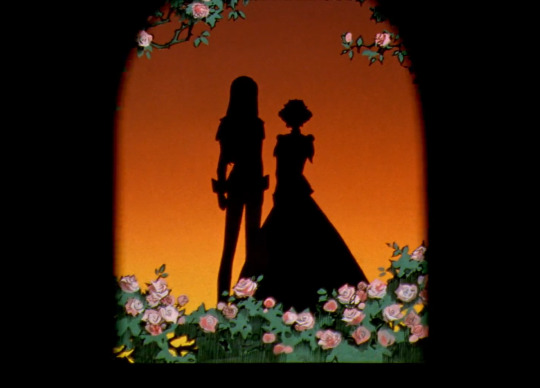
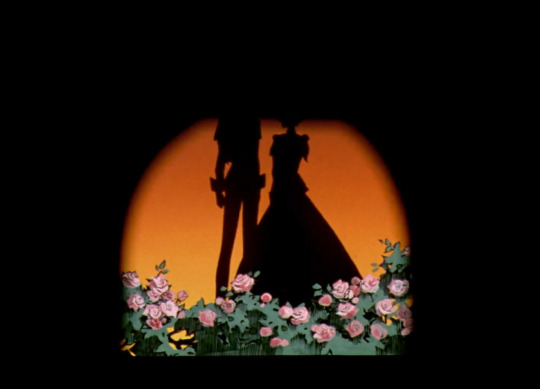
this ohtori arc elevator sequence is very reminiscent of an analogue film strip running through the projector. spectacle and simulation. architecture as framing device, the spatial ordering of life lines.
The lines we follow might also function as forms of 'alignment,' or as ways of being in line with others. We might say that we are orientated when we are in line. We are 'in line' when we face the direction that is already faced by others.
Sara Ahmed Queer Phenomenology
#queer life as one that fails to make the gesture of normative return; an aberration from the straight line#revolutionary girl utena#rgu#rgu meta#sara ahmed#queer phenomenology#utena tenjou#anthy himemiya#knives
564 notes
·
View notes
Text
akio and the coffin
it’s fascinating how akio both literally IS the coffin of ohtori academy and, simultaneously, is trapped by it. ohtori academy is in many ways a manifestation of the ugly side of adolescence, of clinging on to something in your past and refusing to move forward in your life. every character has something they continue to hold on to despite the fact that they ought to let it go for the sake of growing and maturing. for example, saionji has his inferiority complex regarding touga, his refusal to let go of the simplicity of their childhood together when he felt that they stood on the same ground, and that touga saw him as an equal. everything he does in the series is an attempt to make himself feel as though he is finally on equal grounds with touga. if he would only stop tying his self-image to the perception that touga is somehow above him, that touga looks down on him, then he would be able to let go of that sense of inferiority and move on. but he can’t. juri refuses to let go of the pain she feels regarding her past with shiori, and continues to see shiori as someone who is “innocent”, albeit cruelly - someone who is unknowing of the pain she causes juri through her actions when in fact, shiori in seducing the boy she thought juri loved was deliberately acting to hurt her. if juri would only realize and accept the true intentions behind shiori’s behavior, then she could get one step closer to understanding shiori, to being understood by her, and moving past the pain of shiori’s betrayal. but she can’t.
most of the characters, except utena and anthy of course, remain in ohtori by the end of the show. while they’ve all made progress in “maturing” thanks to the events they experienced throughout the series - both saionji and touga’s as well as juri and shiori’s relationships have gotten visibly better, as shown in the final medley of scenes - they still have more growing to do, hence why they remain in ohtori academy until their time comes. one day, the show suggests, they might also revolutionize their own worlds - their own selves - and finally leave the coffin of ohtori behind as well.
so where does that leave akio? i think he can be said to literally be the coffin of ohtori in that he is explicitly shown to try to manipulate others into remaining stagnant, to clinging on to whatever toxic things they are struggling to process and come to terms with, though this is of course only shown via the characters he most directly interacts with. naturally it comes across most clearly with anthy, although i think utena and to a less direct extent, touga, are the other two people who are the most straightforwardly influenced by him. when it comes to anthy, she clings to her love for the person her brother used to be, the older brother who, at least as she perceived, was kind and caring and wanted to protect people. to protect that older brother, she willingly took on the hatred of the world, and continues to endure the pain of it to this day for what is implied to be centuries. but akio has shown time and time again, through the repeating dueling cycles, that if he was ever kindhearted and genuinely caring, those parts of him are gone now. i do believe he cares about anthy to an extent even now, but whatever affection he has for her is paltry in comparison to his desire to reclaim his power as prince dios. it’s for that purpose that he set up the entire dueling system, for which he freely allows duelists to treat anthy like a prize and an object. and additionally, because anthy is so integral to the power he has now in ohtori, he uses emotional, psychological, physical, and sexual abuse to keep her tied to him. he’s willing to not just let her wellbeing come last, but puts it at the bottom of the list of priorities, and actively tears it down himself for his own benefit. anthy knows all this - but because she still holds onto that love that she had for who he used to be, she stays with him and does his bidding. and that’s what akio wants. he is the coffin, wishing to keep people in their states of despair, conflict, and pain, therefore ensuring that they are compliant and vulnerable to his manipulation.
at the same time, akio is trapped by the coffin like everyone else. he, like all the other characters, has something that he ought to move on from for his own sake as well as the sake of the people around him: his goal to reclaim his powers as prince dios. akio has failed in this goal every single dueling cycle that happened before the show’s events, and as displayed in the final episode, he definitively fails the one that takes place during the show as well. he can attempt the cycle over and over and over again, redo and tweak and modify the dueling system however many times and in whatever ways he wants - it’s all useless. there is no sword that can break open the rose gate. there is no way to reclaim his powers. they’re gone, that part of his life is over, and if he accepted that fact, it would allow him to move on and heal from what he experienced. but he can’t. at the very end of the series, right before anthy leaves ohtori for good, he’s typing away just as diligently as he ever did and, completely oblivious, tells anthy that he’s rewriting the rules of the rose crest, that he’ll be counting on her again. and i didn’t pick up on this until rewatching the episode, but it really just hits you then how utterly stupid he looks, working so hard and speaking so confidently about the upcoming dueling cycles as if any of them are ever going to matter in the slightest. i love anthy’s response to him too; i love the subtle but at the same time so blatant scorn in her words: “you really don’t know what’s happened, do you?” because once again, throughout all this, akio has learned nothing. he hasn’t realized it’s useless, what he’s trying to do; he hasn’t realized all the effort and pain and anguish he’ll cause in people for yet another dueling cycle will never make any difference. he is unable to come to terms with the reality that he will never have his powers as prince dios back. he refuses to move on.
akio is the coffin of ohtori, wanting to keep others in stagnation and regret. he’s also trapped by the coffin, incapable of maturing past his own stagnation and regret. and it really, really says something that all of the other major characters of the show, who have been in ohtori for far shorter a time than he has, have been able to make visible strides in their growth. anthy, who is the only one comparable to akio in terms of duration at ohtori, revolutionizes her world and leaves. meanwhile akio, as deluded and self-unaware as he is, hasn’t made a single step of progress in all this time. the only thing he does is call in bewildered desperation after anthy as she finally leaves him behind, still totally clueless as to what has happened.
tldr; i once saw an author say one of her characters represents inertia, in fact he is inertia. i think that’s a spot-on explanation of akio, at least in terms of what he symbolizes in the story. i want to beat him in the dick with a cactus
#revolutionary girl utena#rgu meta#shoujo kakumei utena#saito chiho#chiho saito#ikuhara kunihiko#kunihiko ikuhara#akio ohtori#ohtori akio#akio rgu#rgu akio#anthy himemiya#himemiya anthy#anthy rgu#rgu anthy#touga kiryuu#kiryuu touga#touga rgu#rgu touga#kyouichi saionji#saionji kyouichi#saionji rgu#rgu saionji#juri arisugawa#arisugawa juri#shiori takatsuki#takatsuki shiori#juri rgu#rgu juri#utena
191 notes
·
View notes
Text
I'm rewatching Utena for the 4th or 5th time, and I had a revelation about something that's always puzzled me. In episode 12, Anthy has an internal monologue about how seeing Utena defend her against Touga while wounded reminds her of something, but she doesn't tell us what. I believe this is the only time in the entire series that we hear Anthy's thoughts, which makes me think it's pretty important.
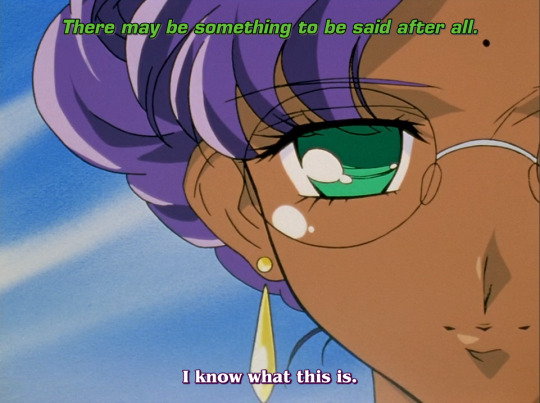

The obvious answer is that Utena reminds Anthy of Dios - Utena has been set up as a prince defending Anthy, we've gotten all kinds of language about her summoning the power of Dios, and the fairytale, silhouette version of Dios even flashes on the screen as Anthy thinks this. But that never felt quite right to me. Even though we're told over and over that princes defend people, we never see Dios defending anyone. We never see him do anything at all, really!
I think, in this scene, Utena reminds Anthy of herself. We don't ever see Dios defending Anthy, but we do see young Anthy, wounded, defending Dios! Anthy's shock isn't because she sees that Utena is like Dios - she's known all along that the dueling game is setting up Utena to be like Dios; that's the point. Anthy's shock is in the sudden reminder of who she used to be, before she fell into a cycle of abuse, victimhood, and helplessness. Anthy used to be someone who could defend people; she used to care; she used to have agency.


It foreshadows the end of the series: Utena can't save Anthy. Even in winning the duel against Touga, she's still perpetuating the empty cycle; Anthy is still the Rose Bride. But Utena can remind Anthy that she's a person, she has agency, and she can choose to just walk away. This is the duel called "self": for Utena, it's about taking back who she used to be. And it's a reminder to Anthy that someday, she can do the same.
370 notes
·
View notes
Text
people who get defensive of juri when you say that she sucks the way every member of the student council sucks fascinate me. bestie i thought we were here for the liking morally complex gay people show. the 'queer identity is not inherently divorced from patriarchal gender roles' show. the 'when you put on the duelist ring you are participating in the enforcement of ohtori's social norms regardless of whether you tell yourself that you're the exception' show. why don't you want to talk about how juri also hits anthy.
#revolutionary girl utena#juri arisugawa#i mean i know why it's because she's one of the easiest characters to relate to#so people completely unironically put her on the exact same pedestal shiori does#rgu meta
162 notes
·
View notes
Text
one thing i am so grateful for in utena is that it refuses to demonize gender nonconformity or butchness… so many stories with a character like utena would present her wearing the rose bride gown at the end as a Positive Good because “Let Women Be Feminine!!!! and wear dresses and makeup and skirts!!!!!! #girlboss!!! 👛👗🎀🛍💄”
it is rare to find media that includes masculine women/gnc people to begin with, but it feels like stories which present our existence with any nuance beyond “just a phase” or “toxic masculinity” or “man hater” are all but nonexistent.
and yet the first arc culminates in utena trying to conform, trying to be normal, trying to be feminine — not because some teacher dress-coded her with a written rulebook, not because she realized that her gender-nonconformity was ~a phase~, but because she was manipulated in a much subtler and damaging way. she was told over and over again that she could never be good enough as a “prince”, that she could never have agency or fall in love with a woman or try to protect the people she cares about, because she’s a “girl”. and that arc resolves thanks so much to the love of other queer women: wakaba loves her enough to call her out when in any other story she would be giving her the “makeover”. juri gives utena her sword from one gnc person to another when in any other story she’d be the mean bullying lesbian who’s #notlikeothergirls. and instead of becoming the image of a good straight gender conforming woman, utena uses that queer love to reclaim her true self.
i love utena because she’s not a good, palatable gnc person. she’s not the palatable tomboy that’s gender-conforming in every way that matters and especially not a Gross Yucky Lesbian. she presents masculine. she acts in ways that are scolded (and admired!) for being too “boyish”. utena self-refers using masculine pronouns. she’s called “girl-boy” in a way that felt very true to my own experience growing up. she wants to be a prince, not a princess, and eventually she abandons those gender roles completely. she falls in love with a woman and loves her enough choose her, and enough for her to save herself. i just love utena.
#just. ugh#i feel like this is such a common experience for queer folks too#like trans people lesbians butches etc etc etc#rgu#rgu spoilers#rgu meta#utena tenjou#revolutionary girl utena#shoujo kakumei utena
371 notes
·
View notes
Text
Utena - Analysis on the opening
I don’t know if someone has already done it, but here’s my interpretation of the opening.
Warning: very, VERY long post and mention of scenes from the show, enough to be considered spoilers (sorry 😅)
Edit: I’ve made an analysis on the first ending as well

Let’s live heroically, let’s live with style. (Just a long, long time.)
The opening starts with our two main characters naked and in a fetal position, indicating their status of “newborn” in the story. Then, they are clad in the garbs of their respective roles. Interestingly, despite facing and leaning toward each other, their eyes remain close. In the case of Utena, it symbolizes her inability to see beyond her own narrative of the heroic prince saving the princess. As for Anthy, it’s her resignation to not see anything beyond her role of Rose Bride which she has played for decades/centuries, hence the long, long time.

Even if the two of us are torn apart… (Let go of me…)
…take my revolution.
In the next sequence, not only are they not looking at each other, but they are also back-to-back, another indication that they are positioned to be at odds with each other, whether they want to or not. Still, despite the obstacles thrown at them, despite Anthy’s attempts to make Utena give up on her (“Let go of me…”), the latter doesn’t stop telling her to take her hand (revolution) and that’s what she did.

In the sunlit garden, we both joined out hands.
Miki’s sunlit garden is an idealized memory, so it makes sense to compare Utena’s goal of becoming a prince to the former. Also, the tower, where her journey is supposed to end with her heteronormative “happily ever after”, is where she and Anthy join hands and the latter’s revolution begins.
The sequence where Utena walks with the male students has a “one of the boys” kind of vibe and that might have been the intent. The tomboy character may appear progressive by refusing to conform to traditionally feminine gender norms, but that’s instead a sexist concept because it implies that Utena’s gender, her femininity (and by association, anything branded as “girly”), is the one thing that makes her less than her fellow male schoolmates. Also, she looks over her shoulder, something or someone (Anthy?) catching her attention which stops her from blindly following the other boys’ lead.

Drawing close for comfort, we both swore…
In Anthy’s case, due to her hair and skin color, the vibe she emanates as she walks with her fellow female schoolmates is “not like other girls”, another trope which hurts women by marginalizing the few “different/special ones” from the “normal/average ones” or vice versa. However, the reason she turned around (Utena? Her perspicacity?) is what helps her preserve the part of her identity which is still deep within her. So being different isn’t a bad thing as long as every person, especially girls, are given the same courtesy.
If you read the Japanese lyrics, you would know chikai (from chikau, meaning “to swear/vow”) is at the beginning of Anthy’s sequence, when we see the gates of Ohtori, where she swears to find Utena again.
(Also, did you notice that their respective sequences begin with a shot of where their story in Ohtori ends?)
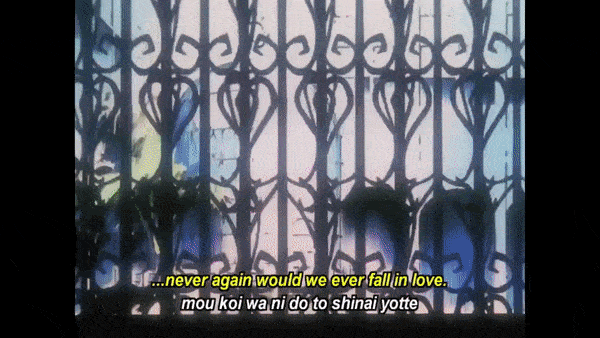
…never again would we ever fall in love. (Every time.)
This line is sung as our two protagonists stand face to face in Anthy’s cage-like greenhouse, where the cycle of the quest for revolution always (re)starts. That vow of never falling in love again, along with that Every time, makes me wonder about how many games had taken place before Utena. How many times had Anthy been engaged to a “chosen one”? How many of those “chosen ones” did she grow to love, yet still choose to betray? How many times did she swore to never love another again only to do so despite said promise to herself? Utena, by ending the cycle, makes the vow mentioned before much sweeter: she and Anthy choose to never fall in love again because they have pledged their love for each other till death do them part (like a married couple 🥰🤵🏻♀️👰🏾♀️🥰).

I see that photo of us standing cheek to cheek…
…and place a bit of my loneliness in our smiles. (Revolution!)
At this moment, the past represented by Utena and Anthy lying down, facing each other, and the future represented by the lyrics paralleled each other.
Past: a (naively) smiling Utena and a (falsely) smiling Anthy -> Anthy gives the white rose, the symbol of the Prince and by association, patriarchy, the source of her eternal pain, to Utena who is unaware of the dark history connected to it -> (failed) Revolution by dueling (transition to the dueling arena)
Future: the photo at the end of Episode 39 -> Anthy’s longing for Utena -> (successful) Revolution by leaving Akio

Even if I dream, even if I cry, even if I get hurt…
…reality keeps on coming recklessly.
This sequence is about the Duelists.
Utena being the one who dreams is self-explanatory.
Saionji, if you pause at the right time, is seen with tears in his eyes. Behind his arrogant attitude is nothing but a mentally weak and insecure boy who throws violent tantrums when things don’t go his way.
Juri is no doubt the one most hurt in the series, not only because of her gender, but also because of her sexual orientation (I’ve made a post about it).
Miki and Nanami being the ones hit by reality makes sense due to the knowledge they idealize the relationship they shared with their respective siblings when they were children.
But what about Touga? Maybe it’s the confidence that he could get the power to revolutionize the (his) world if he emulates the system which had hurt him only to realize that such way of doing things won’t get him closer to his goal. Or, since he’s the first antagonist of the show, giving us a taste of what Akio, another male character whose inside is the opposite of his princely front, could do to girls, maybe he represents the reality/truth of the (imperfect) world.
All these Duelists, these teenagers, fight each other for a purpose and that later turns out to be futile after they find out that the rules they play by are a cover for a much more sinister plot.

I wanna find my own place, the value of being…
The first half, we focus on Utena who raises her sword with a determined look as the blue sky turned golden and the dueling arena crumbled. Utena rejects the narrative Akio wants for her and in the process, breaks the world he has created (and kept Anthy in).
While we zoom in on Utena, symbolizing her will to move forward, it’s the opposite with Anthy. Expression blank, she put some distance between her and Utena/the viewer(s), letting herself (her true self) disappear with Akio’s self-made world.
This sequence foreshadows what will happen in Episode 38.

…the person I’ve been until now…
But as it is shown in Episode 39, Anthy didn’t disappear in the fall of Akio’s world and stood up against her brother (riding a horse), mirroring Utena.
Also, we see Dios opens his eyes as the dueling arena crumbles to dust.
In Episode 13, Akio is conversing with a “sealed” Dios who “glare[s] at” him for wanting to bring the Prince back into the world. Dios had been “sealed away” because playing Prince had been killing him. Anthy had become the world’s sole target of their hatred so that he would no longer carry that great burden on his shoulders ever again. Dios is angry at Akio for not only trying to turn her sacrifice into a fruitless endeavor, but for also taking part in her eternal torment by making her an accomplice in his scheme.
Akio has internalized the teachings of patriarchy. He now idealizes the Prince, forgetting that his current self isn’t the result of Anthy sealing the latter’s power away. He had, of his own volition, casted away his “nobility” and enjoyed the privileges of his gender. He was free of the duties expected from the Prince yet chose to not use that freedom to search for a way to save his sister without taking on that mantle again. Protected by a patriarchal system, Akio is in fact afraid of carrying the weight of the world on his shoulders again despite his desire to return to his “glory days”. He wants to be the Prince again (regression), but also doesn’t want to give up his life of privilege. There is no step toward self-improvement. And that’s why his quest for revolution is nothing but a pretext to play people like a fiddle, especially the vulnerable ones like children and women. I think he subconsciously knows he’s maintaining a perpetual cycle meant to end in failure, but he’s too lost in his self-centeredness to take a third option, to destroy the limits of his coffin. In other words, Akio must let patriarchy (manifested through the game and the dueling arena) disappear in order to regain the lost part of him that is Dios, because what the latter really wants is to live in a better world, one where Princes aren’t needed anymore.

Let’s find the strength to throw it all away.
Strip down to nothing all.
Utena having the strength to throw everything away references her decision to give up on the heteronormative “happy ending” given to her at the cost of Anthy’s well-being.
Anthy being stripped of everything references her true (naked) self within her coffin.
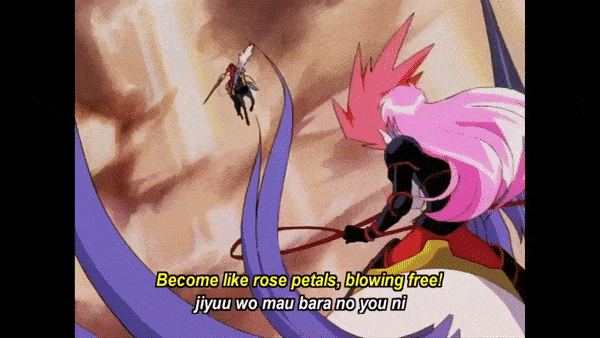
Become like rose petals, blowing free!
Honestly, that part was a bit difficult to interpret. We do see petals blown in the wind when Utena beats boys at basketball, but the only time I saw them concerning Anthy (and by association, the duels) was when the Duelist gets “deflowered”, and I didn’t get a feeling of freedom from it. Or so I thought at first. Knowing that the duels are part of Akio’s plot which is nothing but a wild goose chase, it makes sense in the context that losing means some time away from Akio’s control and thus, a chance to reflect and for self-improvement. Also, if the dueling arena is like a groomed flower, then its rubble is the petals. This might be foreshadowed in Episode 9, when Anthy falls with rose petals scattered everywhere as Utena tries to catch her.
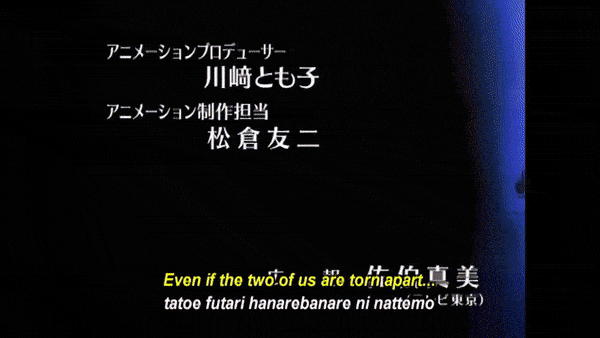
Even if the two of us are torn apart…
…I swear that I will change the world.
We have a return of Even if the two of us are torn apart… (Let go of me…) / …take my revolution. This time, there’s no request to let go of the other party and Utena is taking the next step toward (self-)improvement. If you pause at the right time, you can see she is not in a fetal position like at the beginning of the opening. Now, it looks like she is opening herself to the real world.
Anthy is not present, but that’s because she hasn’t reunited with Utena yet. Until that day comes, the latter will keep fighting for the world both deserve to live in.
In conclusion, the opening is a summary of the entire series and foreshadows how it would end.
#revolutionary girl utena#shoujo kakumei utena#rgu#sku#utena#utena tenjou#anthy himemiya#utena x anthy#anthy x utena#kyouichi saionji#juri arisugawa#miki kaoru#nanami kiryuu#touga kiryuu#prince dios#akio ohtori#revolutionary girl utena analysis#rgu analysis#revolutionary girl utena meta#rgu meta#rondo revolution#mine
118 notes
·
View notes
Text
The first set of duels all involve seeking a return to a comfortable stagnation or projection. The character has left a state that they wish to return to. The second set all involve seeking to reject the current surrounding world for one that matches their desires. The third set of duels is finally closest to the truth of what 'Revolutionizing the world' is - seeking to prove a change exists in the perception of the duelists - that a level of maturity has been reached and the duelist has grown up - but this change only occurs upon the duelist losing the duel. Without the loss all the third duel accomplishes is the completion of a Rotation on the Revolution. The duelists seek ‘adulthood’ in the belief that doing so will grant them the power to continue to exist unchanged even in new circumstances. Revolution has two meanings within the narrative - a break from stagnant conditions or states, and the completion of a cycle that returns to the start - like a carousel’s spin.
I think that the power to Revolutionize the World that all the characters fight for in Revolutionary Girl Utena is primarily a power to change oneself and break free of the eternal revolution offered by Ohtari and embodied by Akio. Part 1/2 - Mikage & the Black Rose Duelists, Saoinji, Miki, and Juri.
Nanami post link
Black Rose
Mikage in the Black Rose arc keeps trying to kill the Rose Bride and win the power of Dios, but he fails every time since every duelist he chooses is attempting to Reject the world and revolutionize it based upon changing other people. A miracle achieved though sacrificing other people - they pull their swords from others and bear the rose crests of others.
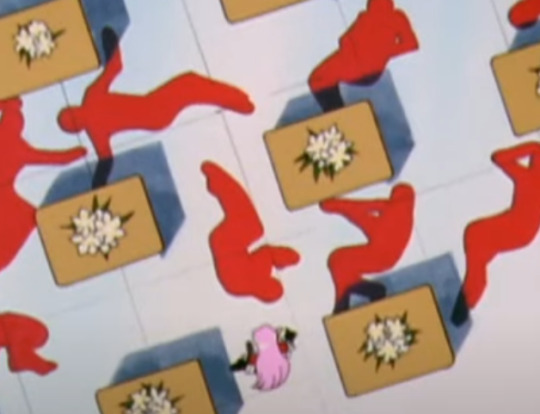
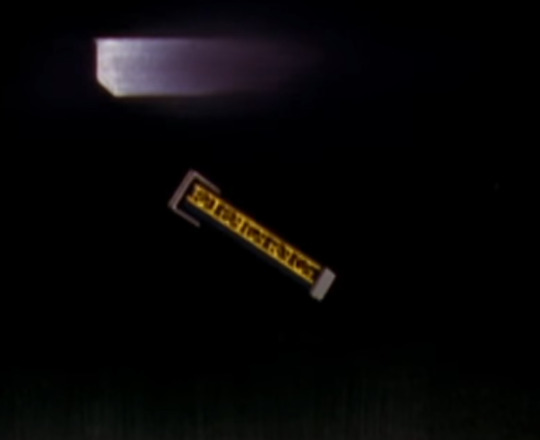
Mikage and the duelists are working on an entirely flawed premise - so each duel ends with another corpse in the crematorium and another chick that failed to break their shell and a return to status quo. Each person dueling is attempting to seek a revolution entirely defined by the perceptions or actions of others - Kaene wants Anthy’s judgement of her (perceived or not) gone. Wakaba wants others to look at her as special (especially Saionji). Kozue wants to protect Miki's innocence, but she also keeps wanting to taint it - her sweet love towards her sibling has turned curdled and she also wants to return to the 'Sunlit Garden'- so everyone who can taint it needs to go. Shiori wants to 'Win' over Juri because she can't believe in Juri's feelings in their clash with her abysmal self-worth and she can't accept her own feelings towards Juri. Tsuwabuki wants to be perceived as an adult and grow up already - though he isn't sure what it entails. Keiko wants to know Touga, and perhaps it is a plain desire common to most of Ohtori, but it’s not one that can be fulfilled while she is the lowest girl on the totem pole and Nanomi is in the way. Mikage himself seeks connection but the person he wants to connect to is terminally ill - so in the ultimate conclusion of this theme of rejecting the world he is seeking Eternity in these memories and reliving the past literally - he is a trapped ghost in a burned down building. The one person rejected is the Onion Prince boy whose basal confession is that he believes the problem is in him - not others.
Saionji
Saionji wants his status symbol back and to have something special that his 'friend' Touga doesn't have and Utena confronts him in revenge for her friend Wakaba first and revenge for Anthy's treatment once she is already committed - later episodes make it clear Wakaba still loves Saionji so it is doubtful that she would have wanted the duel in her honor. As Saoinji scoffingly points out - Utena is the archetypical prince protecting the honor of princesses here. Saionji's 'revolution' is related primarily to his status in the system - without Anthy as his rose bride he is no longer special - just an average upperclassman. His second duel is much the same because despite his belief that he has changed - he utterly fails to articulate 'how' and no other character can even notice how or if he is different. He still seeks to possess the Rose Bride as a status symbol of being 'an Adult' and gaining something that designates him as special - most specifically in regard to Touga. He is the only 2nd time duelist that comes without their own Rose Bride. He's not fighting with his own power/strength of will at all. He's repeating lines said by Touga in the first set of duels, Saioinji is an imitation of an imitation, and it's not very surprising he missed the memo on the change in duel format.
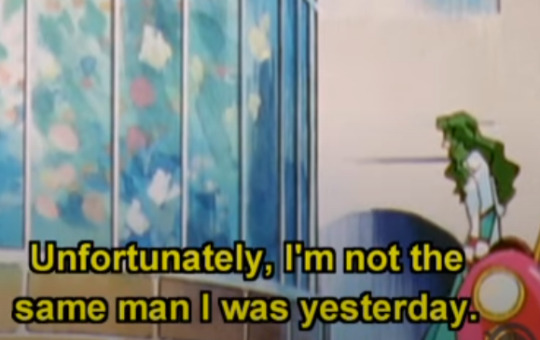

But he seems to have found the route start for the process of growing anyways after being beaten again. Refuting Touga in his desire to be like Akio and accurately pointing out the central premise of Ohtari. He repeats with Touga there is no such thing as True Friendship- but it is still evident that his relationship with Touga only improves again after they fail to complete their revolutions on Akio’s stage.

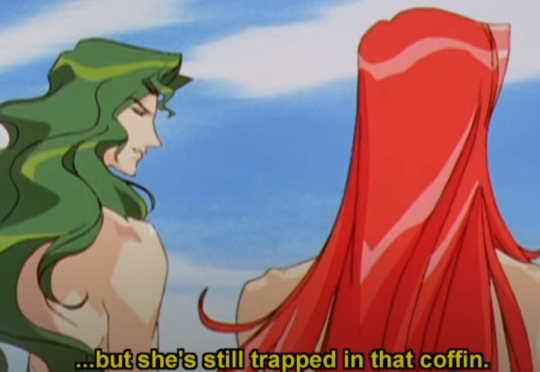
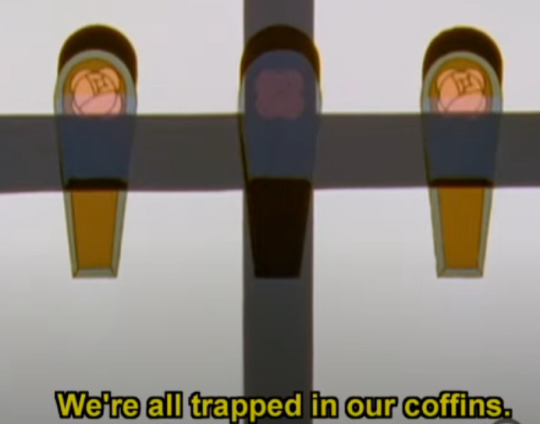
Miki
Miki wants to recapture his “sunlight garden” through Anthy. He is seeking a return to a state which was simple and joyful for him and believes if he can possess Anthy then he can return to that state. Of course, this simple state in his memory doesn't exist. He loses the duels both times because his illusion of how things were was shattered - first by realizing Anthy was cheering for Utena - she was not an empty vessel for his fantasy, second by realizing that both his sister and Anthy had elements of 'adulthood' - he thinks that he is ready to 'get dirty to get what he wants' in regards to maturing his relationship with Anthy and finally the stability and strength to make his place in the world secure. Both he and Kozue wants to have the strength to return to the Sunlight Garden, but only Kozue seems prepared to grab the power to hold the illusion together - in which case she chose an excellent model. Akio is a professional in the art of maintaining an illusion.

Miki ultimately seeks to return to simpler times because he feels estranged in the present - a chick without a home.
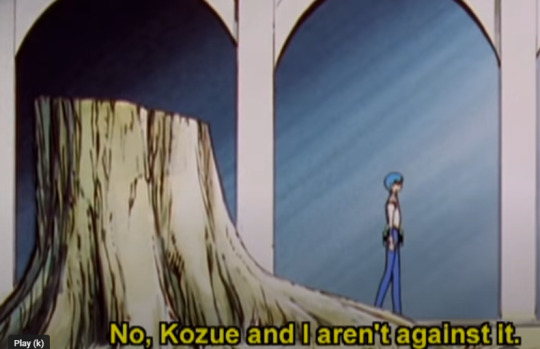
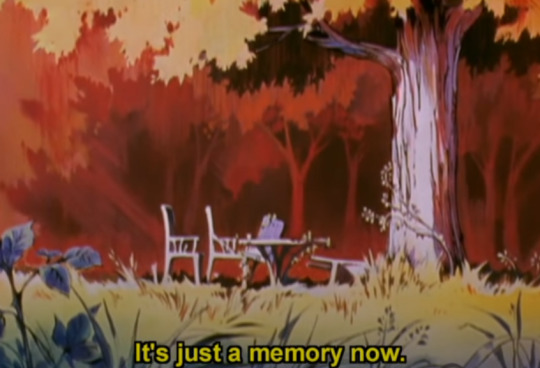
The problem is that his Sunlight Garden is a fragile thing since it is only a facade. Kozue seeks to grant her brother the power of 'Revolution' and take him to the 'world of adulthood' but his sword is still a 'child's sword'. Realizing that he can't return to the past he sought the ability to create a comfortable present - but he can't follow-through with the 'adulthood' embodied by Akio and complete his revolution on the carousel. Perhaps his Revolution requires him to stop trying to fit himself to the dichotomy of either a powerful prince ‘who takes what he want’ or an innocent and pure child ‘who has what’s his taken’ since no such thing as a 'pure prince' who exists without subjecting others or getting subjugated. Perhaps hope exists, he does know a friend or two who also don't fit comfortably into the defined archetypes of princess or prince.
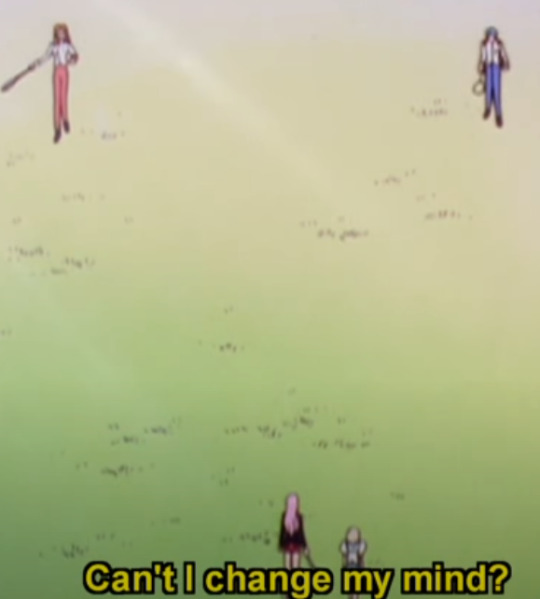
Juri
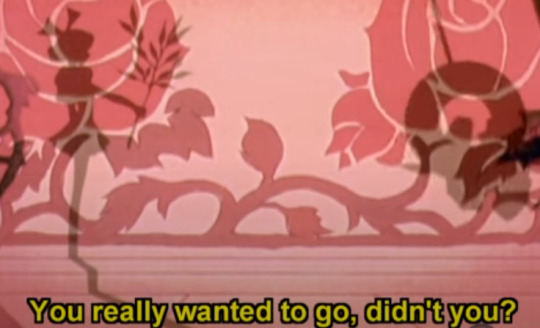
I understand Juri's issue in regard to her personal coffin - but I'm not actually sure the motivations behind her duels with Utena or what she is hoping to achieve. Juri's issue is that she doesn't believe in miracles (Shiori returning her feelings) but she really wants to believe in miracles (She can't give up her feelings for Shiori anyways). Her issue with miracles is "Believe in miracles and they will know your feelings" In this context, her duel with Utena is triggered by Utena telling how her Rose Crest links her to her 'Prince'. The parallel between miracles is the power to bring about connections - Juri challenges Utena to show her proof that her miracle - she will be led to her prince through her ring - is real while the camera focuses straight on Juri's locket - linking the two symbols. Juri believes there is no hope of her feelings or her being accepted if she communicates them to Shiori.
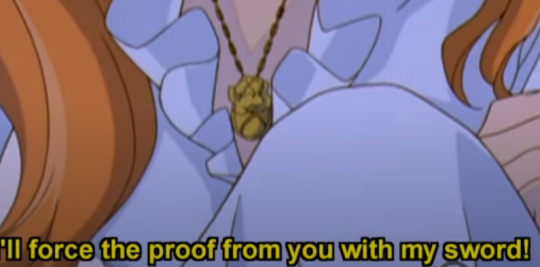
If she wins, she can continue to deny miracles exist while secretly hoping they exist - being engaged to the Rose Bride who is said to grant miracles - quietly locked into believing her feelings can’t be expressed. Losing - she still refuses to say out loud she believes in miracles - but it is still clear she is less hostile to the idea they can happen.
Juri's second duel starts with coercion - her anguish on seeing Shiori's humiliation and obsession with Ruka/Juri is outweighing her anguish on the uncrossable distance between Juri's feelings and Shiori despite their reciprocity. Ruka seems to love Juri and knows Juri loves Shiori and that Shiori can't and won't reciprocate with her issues, Juri loves Shiori but will neither reach out nor give up, Shiori loves Juri but refuses to believe that she is worthy so she must make Juri hate her. Juri and Ruka seem to share the idea - it's fine if they hate me as long as they are free from this toxic debasement that they are trapped in. Juri's growth hinges on accepting she shouldn't sacrifice herself for the sake of Shiori's miracle - love doesn't justify abuse. It is only by losing Shiori’s locket and letting her feelings (and fears) lay bare that Juri can break away in a new direction from the interruption into her cycle instead of a repeat of her past misfortune with Shiori.
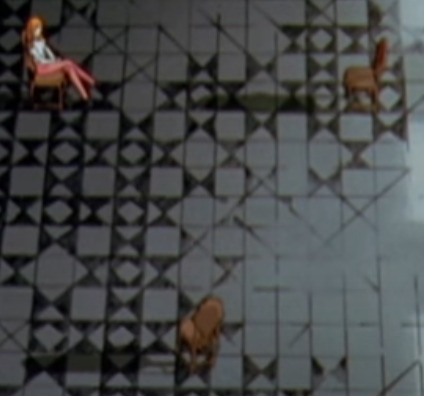

It seems that Ruka succeeds in his goal of letting Juri move on from her obsession with Shiori - though to what degree he intended anything is ambiguous since he goes and dies afterwards. Juri can accept letting Shiori leave her locket and accept it doesn’t need to require her suffering to love Shiori. Unrequited (or believed to be) love can be left to grow wistful - instead of a constant thorn in the heart. Juri has been given a direction to go for when she is ready to Revolutionize her world. She can still love Shiori, but she can't keep letting the rose parasite use its venom.
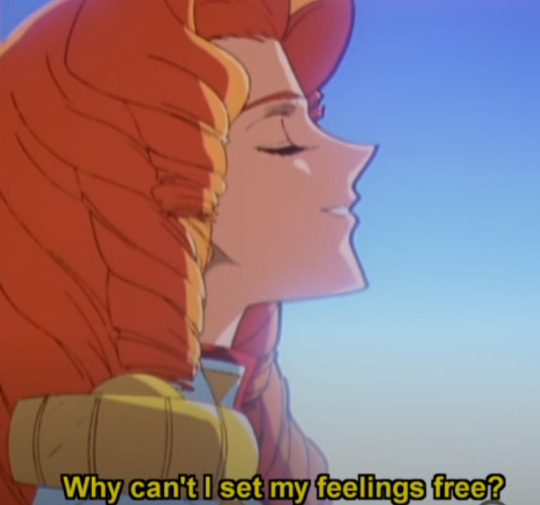
#revolutionary girl utena#proofread later#feel free to add commentary or evidence#feeling very literary analysis today#rgu#RGU meta#Mikage Souji#utena tenjou#juri arisugawa#saionji kyouichi
121 notes
·
View notes
Note
I am know this is an insanity broad question but do you have any specific thoughts on Revolutionary Girl Utena? or anything that you think hasn’t been said or just caught your attention? Your one of my favorite meta writers and I’ve been reading your blog since you were doing semi-regular AOT meta, so I guess I should have figured you had seen the series—RGU is a show so dense symbolism, metaphor, ect.—there was just so much to pick apart. Anyway, I would love to hear anything you had to say abt the series!

Sure, I've always wanted to do a meta on the Black Rose arc which is a totally underrated arc. I feel part of the reason it's not as discussed as other arcs is from a lack of understanding of it's role in the story.
The Black Rose arc is a moon arc.
You've heard of the hero's journey, now it's time to learn about the fool's journey. In Tarot, The Fool's Journey is a journey to self fulfillment where each of the 22 major arcana represent a stage on that journey - an experience that a person must incorporate to become whole.
The fool begins their journey at (0), fresh as a newborn, naive and unaware to the world. The fool is strangely empty, as is zero. Who better to serve as our analogue for the fool then the main character Utena Tenjou, characterized by 1) her naivete and 2) her emptiness.
Several years after losing her parents she lost the will to keep on living. Desperately in search for a reason to live a prince appeared before her and gave her one, showing her something eternal, and leaving with her a ring to lead her to him one day. That was all very well and good, but so impressed was she by the prince, that the princess made up her mind to become a prince herself!
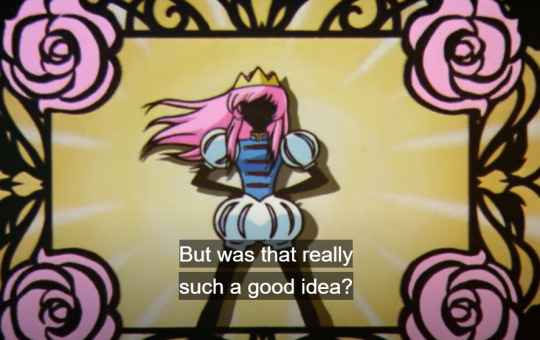
Or so the story goes.
Utena is blindly striding forward (and right off a cliff) like the fool card, and also like the fool she's on a journey to fill her emptiness and become whole. At the start of the story she's not a complete person. She's 14 to begin with, but also look at how she reacts when Anthy is stripped away from her at the end of the first arc and the "purpose" given to her is gone. She becomes depressed and barely responsive, and only stands up again to get that purpose back but she's still clinging onto someone else for purpose. Utena is like the fool, on a journey to become a complete person by gaining knowledge of the world.
That is what I would say separates the Hero's Journey from the Fool's Journey, the Fool's Journey is a Jungian narrative in nature. It's not about battling obstacles like in the Hero's Journey, but about the process of individuation. Individuation is the process by which an immature and fragmented psyche, and the experiences of a person's life, become integrated into a well-functioning whole. You can integrate your past memories, your shadow in a jungian sense, your subconscious, into a well-functioning whole.
Utena is not whole however by the time the Black Rose arc comes around, and her lack of awareness of this fact and of her own shadow is exactly what allows it to overtake her.
So we're following Jung here. Jung, Jung, Jung.
Jung and Tarot go hand in hand because Jung believed in archetypes, sets of symbols that were universal across all cultures, that appeared in both dreams and mythologies and were deeply meaningful to us on a subconscious level. The idea of prince and princesses in Utena are a Jungian Archetype. The Moon card Tarot also has major associations with Jung's idea of the subconscious.

PIctured is the full moon int he ngiht sky, positioned between two large towers. The moon is the symbol of dreams and the unconscious,it's light is dim comapred to the sun and only slightly illuminates the path to higher consciousness leading between the two towers.
In the foreground is a small pool, representing the watery, subconscious mind. A small crayfish crawls out of the pool, symbolizing the early stages of unconsciousness unfolding. A dog and wolf stand in a grassy field both howling at the moon, representing both the tamed and wild aspects of our mind.
The moon is a card heavily tied to Jung's idea of the subconscious, or the shadow. If the persona is our outer face to the world, what “what oneself as well as others thinks one is” [CW9 para 221], the “shadow is that hidden, repressed, for the most part inferior and guilt-laden personality whose ultimate ramifications reach back into the realm of our animal ancestors…If it has been believed hitherto that the human shadow was the source of evil, it can now be ascertained on closer investigation that the unconscious man, that is his shadow does not consist only of morally reprehensible tendencies, but also displays a number of good qualities, such as normal instincts, appropriate reactions, realistic insights, creative impulses etc “ [CW9 paras 422 & 423].
Jung believed in a separated consciousness, the conscious mind is the persona the light we can see and the shadow is the subconscious mind which consists of all that we are unaware of and/or is hiding in the dark, quite literally the shadow of our conscious minds.
In Fool's Journey the Moon Card is the stage at which the light is so dim that our shadows become the longest. When I say a Moon Arc in any kind of story, I mean a story arc where characters are essentially caught in the Moon Phase of the fool's journey, which is a special time of confusion and illusion.
Essentially, the Star which is the card preceeding it is the card of temporary inspiration. The star's light is what makes the fool vulnerable to the moon's illusions.
The light that illuminates this for him is The Star (17) which provides hope and a sense of renewal; this is the light at the end of the tunnel. The Fool feels inspired to start shining as his true self. However, its opposite – The Moon (18) – represents any fears and subconscious programming that may prevent him from enjoying this new state of bliss. Light casts a shadow and the shadow, in this case, is the old anxiety and fears which may rise to the surface when attempting to shine brightly as The Star.
The light of the star makes the fool vulnerable to the illusions of the moon. His positive emotions aren't subject to mental clarity. In his dreamy condition, the Fool is susceptible to fantasy, distortion and a false picture of truth.
So that is the moon arc in a nut-shell, an arc where a character gets too close to the light only to be trapped in shadows. How else can you describe the confusing Black Rose Arc but the characters themselves being trapped within a mage of illusions? Much like a dream the characters are trapped in, there's no sense of direction, time flows strangely, and the events of the entire arc are forgotten by the time the characters wake up.
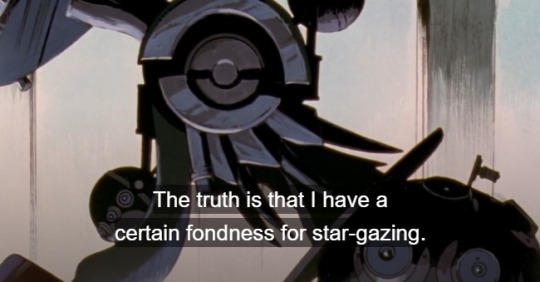
I'm not making up this Tarot symbolism either, in the first episode of the Black Rose Arc we are introduced to Akio, Anthy's older brother who likes to gaze up at stars in an indoor planetarium. A figure who gives advice to Utena all throughout the arc, but who is also clearly hiding another agenda and misleading her on purpose. The light of the stars leads to the illusions of the moon. He even discusses the moon with Utena in Episode 15.
Utena: Akio-san, you really think about your sister a lot, don't you?
Akio: Do I?
Utena: I probably wouldn't understand since I don't have any siblings myself,
Utena: ...but what does it mean for a girl to have an older brother?
Utena: What's this?
Utena: The moon?
Akio: Normally, it's something useless and of little concern.
Akio: But, every now and then, you look up at it and feel a certain degree of comfort
In this context he uses the moon as a metaphor for a sibling, someone who's always there but you don't usually notice them, but those words could describe the subconscious mind as well. Also, one final instance of star / moon symbolism within this arc the stars made by Akio's projector are fakes. The stars themselves are illusions.

The Back Rose Arc follows a formula to a T. Every episode a duelist comes to the Mikage Seminar for help (which is specifically a therapy seminar more Jung symbolism right there), they begin talking about their problems as an elevator descends down an elevator shaft and the voice listening urges them to go deeper.
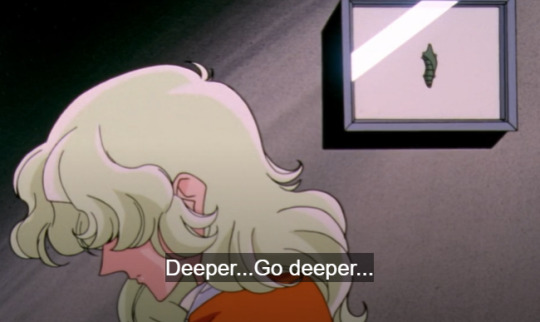
Utena later rides an elevator up to the dueling arena too, because the elevators are symbols for traveling to different areas of consciousness. The three levels, the dueling arena at the highest, the academy on the ground floor and the bottom of the elevator shaft era a metaphor for Freud's iceberg theory of consciusness which similarly divides the human mind into three levels.
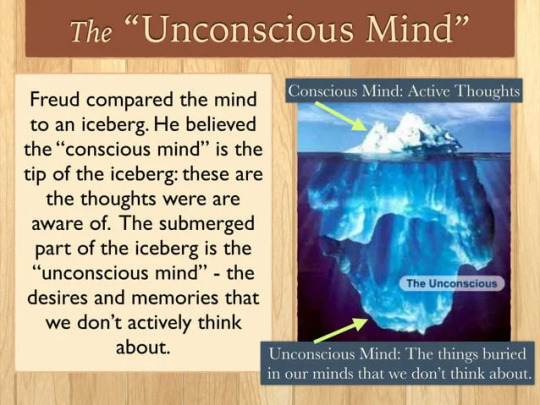
Not only are the characters physically descending down an elevator shaft, they are also plumbing the depths of their own unconscious minds and revealing to themselves what they have intenionally kept hidden and repressed by trying to bury it that deep.
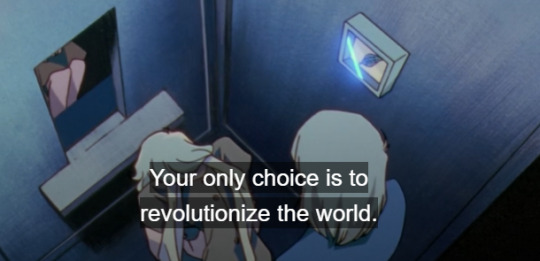
On the wall there's a specimen of a butterfly that slowly reverses its metamorphosis, from a butterfly, to chrysallis, to caterpillar, and then to a leaf with eggs on it. This too is a symbol of the unconscious, but this time of Jung, because Jung believed the unconscious mind was made up of our most primal instincts. The butterfly regresses to its infantile state while the characters in the elevator regress with it.
These characters become shadow possessed. In the story quite literally possessed as Mikage uses a black rose to turn them into duelist. However, Jung theorized that traits in our lives we repress or refuse to acknowledge are still there, they just come out in other ways.
“That which we do not bring to consciousness appears in our lives as fate.” (Carl Jung)
In the Curios Case of Dr. Jekyll and Mr. Hyde the good doctor Jekyll is a philantrophist who has lived a good life, but makes a potion to bring out his worst traits and transform himself into a hideous monster, so he can commit barbarous acts and get away with it. He just needs to drink the potion again and return to being Jekyll and all of his cruel acts will be blamed on Mr. Hyde. Over the course of the story the potion stops working and Jekyll can no longer drink a poition to neatly divide between his philanthropic good side, and his ugly bad side which robs and murders. He becomes Mr. Hyde all the time, his shadow gains dominance over him making him shadow possessed.
"With every day, and from both sides of my intelligence, the moral and the intellectual, I thus drew steadily nearer to that truth, by whose partial discovery I have been doomed to such a dreadful shipwreck: that man is not truly one, but truly two.” - Robert Louis Stevenson
Not only are the Black Rose Duelists possessed by their own shadows, the repressed qualities that are brought out in the Mikage Seminar's evil therapy session but they themselves also serve as shadows figuratively in story to the duelists they steal the sword from.
Kozue is the fixation of her brother the chaste and knightly Miki's madonna-whore complex, while Miki appears to be the most harmless of the boys he has an obsession with purity especially in his childhood days that he projects onto his sister and also any woman resembling his sister like Kozue.
Juri is the calm, cool, and collected female of the student council. Immediately seems like the most decent student council member. Just as looked up to by all the female students as Utena is. Until you find out she's a lovesick puppy reduced to a total emotional wreck over her unrequited love, unable to do little more than pine over her in secret. Then you meet the person she's in love with and her fixation on her friend Shiori just makes her look even more desperate.
Nanami is desperately attempting to stand in for her brother as the student council president, yet another one of the many ways she tries to earn his affection as his little sister. Nanami's desperately trying to recreate the closeness her and Toga had as children, but Toga's already left her behind for the world of adults, so now she's stuck trying to prove she can join him there when she's not even close as an incredibly high strung and spazzy thirteen year old who's more naive then even the younger student council members. She also has a kid tagalong who is three years younger than her, the same age gap between Nanami and her brother, who's also desperate to enter the same age group as her and be her equal but for the most part just gets treated like a pet or toy.
Kozue takes the sword from Miki, because Miki's issues revolve around his relationship with his sister which is a constant problem that plagues him in his life but something he chooses to ignore rather than address and fix.
Shiori takes the sword from Juri because she too is a shadow archetype, the object of Juri's affection but someone she doesn't talk to, or attempt to mend their relationship, and she especially doesn't seem to understand the real Shiori to the point where you wonder why Juri is so hung up on this person in particular. Is she even hung up on the real Shiori or is it just a fantasy because the real one falls far short of the romantic ideal that has Juri wandering the gardens at night and composing poetry like she's Lord Byron.
Mitsuru takes the sword from Nanami, because Nanami can't see the fact that the way she's treated by her brother, is ultiamtely the way she treats Mitsuru. No matter what Nanami does or how hard she tries to earn it, nothings going to close the gap between her and her brother and she can't force it the same way Mitsuru can't magically become thirteen.
Toga's is the hardest to fit into this category because he's not really around this arc and Keiko isn't much of a character, but it's interesting nonetheless one of Toga's many groupies is convinced of this cinderella like fantasy that Toga's evil sister is getting in the way of her true love with Toga and only if Nanami were out of the way Toga would be hers and hers alone. Just completely unaware of the way Toga treats women and just who Toga is in general. .
It could be a shadow archetype in two senses, one just the bright image of the prince has caused everyone even Toga himself to not notice who Toga really is as a person. They're too caught up in the romantic fantasy of Toga. Or maybe since Keiko taking the sword from Toga practically looks like she's assaulting him in a hospital bed, it could be showing the darker side of the way Toga views sexuality, that it's not necessary something he even likes or wants and has harmful connotations with him. Two it could just be another shadow archetpye for Nanami, there's really no becoming Toga's special girl. Toga's not really going to treat you any differently from everyone else, because he is for reasons completely emotionally unavailable.
Oh, while editing this post I realized I skipped Wakaba and Saionji. Very quickly Wakaba's relationship with Utena mirrors Saionji's with Toga, and Saionji similiarly wants to be someone important / a main character / special like Toga is because he believes it's the only way they can be equals. Wakaba's inferiority complex similiarly drives a wedge in the friendship between her and Utena. Wakaba also kind of uses Saionji as a rose bride of source to validate her feelings and make her feel special when he's relying on her for a place to sleep, whereas Saionji really only seems to want possession of Anthy and the Rose Bride to get one over on Toga so he won't have it.
Not only are the black rose duelists shadow possessed people, but the student council duelists have their swords stolen (symbols of agnecy, power, etc) by their shadow archetypes within the story. Other characters in the story who embody their repressed issues.
They confront their Mr. Hydes and then lose to them. They are temporarily made aware of the moons in their lives, which as Akio describes is someone normally useless of little concern but is always there nonetheless. He was using that to describe himself and Anthy, and by association Miki and Kozue but it applies to almost every duelist / black rose duelist pair, someone who is usually there but they take for granted, or ignore, or in Juri's case just don't want to confront. The Black Rose Arc forces a confrontation for each character with both their shadow, and their shadow archetype.
I could go list the similarities and differences with each set of character but I don't want to go on forever, so maybe in a post for another time. Instead I'm going to focus on the main one at the end of the arc and precisely why this arc is so important Nemuro Mikage, the shadow archetype to Utena.
In all mythologies there appears a trickster, a character which challenges the current ruling authority.
From mythology it is the character of the Trickster “…a collective shadow figure, a summation of all the inferior traits of character in individuals” [CW9 para 484], whom Jung thought could save us from ‘hubris’ and free the conscious mind from its fascination with evil. The trickster is usually thought of as atrocious, unconscious and unrelated, but someone who can nonetheless transform the meaningless into the meaningful. Often encountered at cross-roads, s/he is always moving, duplicitous, sexually rampant and a joker. The trickster is best portrayed, perhaps, by the figure of Hermes, who gave Pandora (‘the all-gifted one’) audacity and cunning.
From the shadows, and quite literally from nowhere appears Nemuro Mikage, a character who believes he can take the power of miracles for himself and also replace the Rose Bride by killing the original and making his partner Mamiya into the new Rose Bride. Can he even do that? How does that work? Who knows, this is Utena we don't explain anything.
The important part is Mikage is the manipulator who challenges the rules at Ohtori, and the established order attempting to subvert things. That's what Utena hates him the most for, being a person who willingly manipulated people who came to him with their issues, twisting them into thorny black roses to lash out at Anthy, and therefore Utena as well. Not only is Mikage made up of inferior character traits he's also an evil therapist who makes you act out on your worst impulses by bringing your worst insecurities to light.
Mikage's not just serving as the temporary trickster archetype however, he's also a shadow archetype of Utena made up of all of her inferior character traits. His name literally means "One's true nature"
根/Ne: lit. 3. “root (of all evil, etc), source, origin, cause, basis” or lit. 4. “one’s true nature” 室/Muro: lit. 1. “greenhouse, icehouse, cellar”.
Nemuro, like Utena is a duelist attempting to seize the rose bride and the power of miracles / eternity / the shining thing for the sake of someone else rather than themselves. They do so because saving Anthy / saving Mamiya gives them purpose.

Nemuro, like Utena is someone who doesn't have friends or family or any connection to the world but suddenly becomes involved in another family consisting of a brother and a sister. He becomes obsessed with the idea of them as a family of three because it fixes the lack of love or connection to other people that is missing in their lives.
Utena becomes obsessed with the idea of playing house with Anthy and Akio, to the point where she completely ignores the true nature of Akio and Anthy's relationship and misses very obvious warning signs. She sees them as a trio especially after moving in with them the next arc. Utena even urges Akio to get in the picture he's taking to commemorate her and Anthy's friendship.
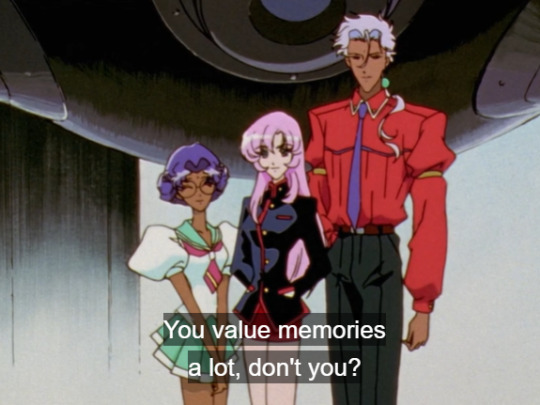
Nemuro also believes he is in love with the older sister, an adult (Nemuro is a child, a child genius but a child nonetheless) but also experiences queer subtext with the younger brother. Nemuro fawns over Tokiko like she is some lost love and makes her the central figure of her motivations, but it's Mamiya he hallucinates actively as being his companion and flirts with when it's Anthy pretending to be him.
Utena is obsessed with a prince from her past driving her actions who is actually Akio, but who she's memorialized in her mind the same way that Nemuro memorialized Tokiko. She also believes there's a relationship between her and the older brother Akio, but that relationship isn't real because she is a child and Akio is an adult. Meanwhile she also experiences the same queer relationship between herself and Anthy who like Mamiya and Nemuro are actuall the same age.
Utena and Anthy's relationship also mirrors Mamiya and Nemuro in that Nemuro's main motivation is to give Mamiya eternity to cure his sickness, something Mamiya has said he doesn't want.
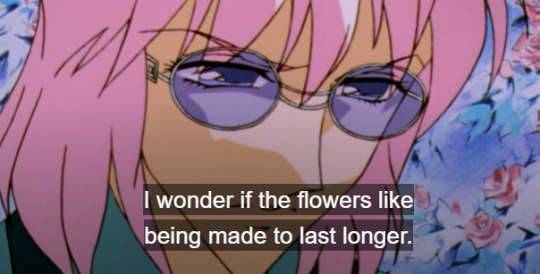
Nothing in this world is eternal, although a heart that longs for eternity could be considered beautiful.
Utena is also attempting to use the duels to protect Anthy, something Anthy never asked for her to do, and something that is actually just Utena selfishly using Anthy to give her some sense of purpose in life.
Nemuro and Utena both imagine themselves as main characters in a narrative, fighting for the sake of their loved ones, and at the end of their hero's journey they will be rewarded with everything they've fought so hard to earn. They're creating stories of their lives and making a narrative to give themselves a reason to keep going after death. For Utena it's a symbolic death, the feeling she should have died alongside her parents. For Nemuro it's his likely literal death, as apparently the Nemuro Memorial Hall and everyone inside died fifty years ago and Mikage has been stagnating for fifty years as a ghost in Ohtori unable to remember the fact that the Mikage hall burning is the long past and he hasn't changed in all this time. They are figuratively and literally dead, and in need of a reason to keep living create a story where they are the main characters.
They also imagine themselves as noble, selfless heroes sacrificing for the sake of their loved ones. Yes, even Mikage when he's playing the villain role of evil therapist and messing with people's minds he's still talking about it as some great heroic sacrifice on his part. It's a bit extreme yes but it's to point out how ridiculous Utena's own hero complex about her duels over Anthy is, especially in Anthy's mind. Nemuro burns down a hall and declares himself a hero for doing so. Utena gets in swordfights behind the school gym class and declares herself a hero. Neither Mamiya nor Anthy ever asked for them to do this, in fact when Anthy starts to genuinely like Utena she asks for the opposite for Utena to run and save herself it's just they decide to do these things on their own while imaining it as some great sacrifice on their parts.
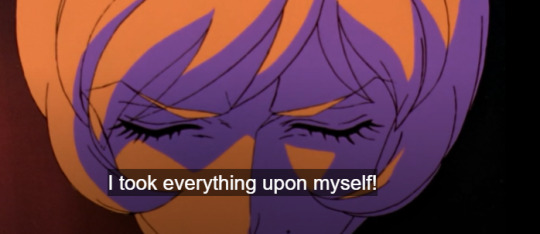
Even your brother's crime!
Souji... Come and see now?
Back then, in that place who was there. Who wasn't there? Who was it that really set that fire?
Mikage makes it like he's a hero who took the heat for Mamiya's crime of burning down the hall when really he's the one who burned down the hall, and he simply blamed Mamiya for it in his memories.
Everything Mikage is fighting for is based upon unreliable memories, lies, and illusions because you know moon arc.
Anthy openly mocks him for his misguided notion and his hero complex that he's doing this to save someone, by unraveling the memories he thought was guiding him right in front of his eyes, sabotaging him in his fight against Utena.
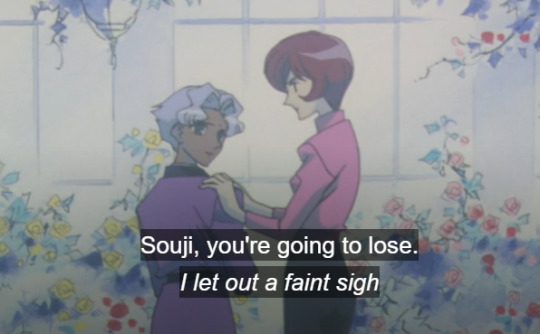
Souji, you're going to lose.
Mamiya!
She will scatter the rose you wear.
What? Where are you? Mamiya! Mamiya!
What the? Who's?
You can't beat her.
You will never beat my sister who dwells in your memories.
We see this exact same thing happening when it's time for Utena to fight Akio, just when she's about to win Anthy sabotages the fight, mocks her for playing hero and says it's impossible for her to have ever won against her older brother Akio. The way Nemuro cries out Mamiya's name in pain and confusion before realizing Mamiya has been dead for years and the person he's been talking to all this time wasn't the real one, even mirrors Utena calling out Anthy's name in desperation as she realizes she never once understood the true Anthy.

Akio calls Nemuro to tell him shortly afterwards that he was using his unreliable memory of the past in order to further his agenda at this school.
Akio: I exploited the illusion you cherished in your memory so much that you even halted your own time.
Akio: The period where you hid the possibility in your heart, not growing up, was useful.
Akio similiarly takes advantage of Utena's vague memory of the prince within her heart, in order to manipulate her into the dueling games even perfectly playing her prince later on to both lead her on by the nose and try to poison her relationship with Anthy.
Which is the greatest connecting thread between Utena and Nemuro. They both are creating fiction in their heads by imagining themselves as heroes in a storybook, and they have both built their entire motivations out of unreliable memories. The foundation they are standing on is a misremembered past. A past they've made into beautiful stories in their own minds.
Mikage: You sound like you're yelling out, "Don't touch my precious memory!"
Utena: What did you say?!
Utena: Don't even talk like you understand me!
Utena: My memory is...
Mikage: I see. It's that memory that's been supporting you up until now.
Mikage: No need to be ashamed.
Mikage: Because the memory you possess is a worthy one.
Mikage: Only those with beautiful memories are allowed to wish,
Mikage: "If only those days could last forever, if only I could still be what I was back then."
Mikage: I know that you're the same as myself.
Mikage: Your eyes are like those people who can't help wanting to make memories last forever.
What is a story but a lie? A fiction? The lies they are told by tohers and the lies they tell themselves are what manipulate them into going forward, straight off of that cliff. After all is there any character with less agency over themselves than the main character of a story? A character in a story doesn't have any free will after all they just go where the author tells them to go, and do what the author writes for them. However, to Mikage and Utena that doesn't even seem to matter because they're both so desperate they need something, even something they subsconciously know is a lie or doubt themselves to keep moving forward. If they don't even have that, then they're dead.
Mikage: I knew since the first time I saw you.
Mikage: You met the person important to you long ago, right?
Mikage: And so, that person changed your life forever, right?
Mikage: You're standing here on the strength of that illusion.
Mikage: That's why you were able to enter the Duel Arena.
Mikage: Am I wrong?
Mikage: After all, you're just like me.
The fools who are the heroes of their own stories, and characters in Akio's stageplay just keep moving forward until they walk off that cliff. They try to be storybook heroes from beginning to end, unable to see the problem in that until it's too late. Mikage represents Utena's own journey through the labyrinth of illusions that is the moon and what's waiting for her at the end.
The Black Rose arc foreshadows exactly what happens to Utena at the end of the story. Nemuro graduates from the academy, disappears, and all trace of him is gone and people quickly forget about him.
Akio: However, that's all over.
Akio: From now on, the path before you is not prepared.
Akio: You, graduate now.
Utena: Oh, darn it.
Utena: What a weird place we ended up in while searching for Himemiya.
Miki: There was a really big fire here a long time ago.
Utena: Really? So there really was that kind of trouble.
Miki: It seems there weren't any casualties, but since it was before the time of the Student Council, no records remain.
Miki: Let's see... What was the building called? Kushiro Memorial Hall...
Miki: Sounds wrong. Noboribetsu Memorial Hall? Argh! I hate it when I can't remember!
Utena similiarly leaves the academy and Akio comments that just like Nemuro she'll fade quikcly from people's minds.
Akio: It hasn't been that long since then, but everybody's forgotten about her completely.
Akio: She didn't cause a Revolution after all.
Akio: Now that she's gone, she was just a dropout to this world.
They also reach their tragic end for similiar reasons, they couldn't stop playing the role of the hero until the very end.

It's pretty much spelling out to us how the series is going to end in the second arc. Utena / Nemuro are brought into the dueling games on a false memory that's manipulated by Akio to give them a reason to participate. In their final duel, they're betrayed by Anthy and sabotaged in the middle of their fight causing them to lose. Afterwards they struggle against the truth. The result of them learning the truth is them being exiled from Ohtori Academy forever, and they are unable to save the person they want to save by playing prince, Mamiya was never alive, and Utena never got to know the true Anthy. All because they decided to play storybook prince in the first place rather than look at the reality.
Utena's however, ends on a much more hopeful note. As she's at least escaped the fiction of Ohtori Academy and Anthy insists that she is still there somewhere out in the real world. Just like the world in Tarot is the last card of the Fool's Journey, where as a whole person the Fool is now ready to join the rest of the world.
However, the Black Rose arc doesn't just foreshadow the ending of the story perfectly with Mikage's ending, it also is just the nature of the moon tarot card itself. People call it fillerly because there doesn't seem to be any real substantive change to the story, but illusions are illusions they're not supposed to be substantive. The characters don't change after the confrontation with their shadow selves.
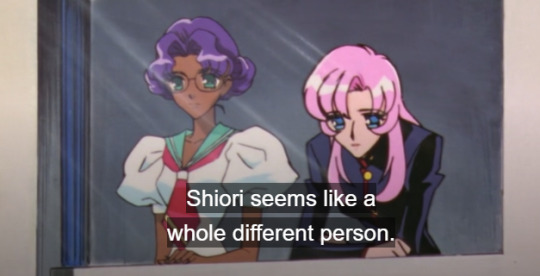
You think so?
Huh but she's.
She hasn't changed. Not a bit.
Number one there's no real end in the conflict between the shadow and the conscious mind and number two that's what happens with dreams they fade in the daytime and are forgotten when you wake up.
That's the moon in general too. Always there for you. You don't usually think about it and it doesn't serve any real purpose, but from time to time you look up at it... and it makes you feel better.
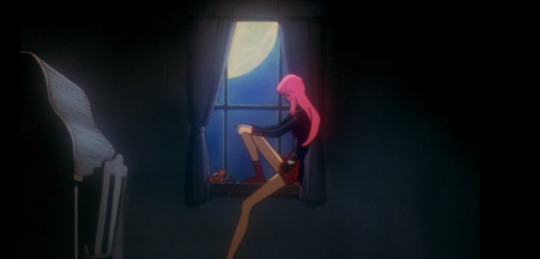
#askspookies#rgu meta#revolutionary girl utena#utena tenjou#nemuro mikage#akio ohtori#anthy himemiya
147 notes
·
View notes
Text
The shadow presence of adults an family in Utena
Currently I try to clear up some convoluted ideas about childhood innocence to agency through social indoctrination depicted in Utena.
Obviously the most present indoctrination happens by Akio's hands, and his extension the form of the panoptic, omnipresent, ever-acting system of Ohtori academy.
But I did catch myself by the mistake to assume every child/teenage character in Utena is solely influenced by Akio. In fact sometimes adults do appear sparsely throughout the show, and it's always relevant. Like the guidance counselor as signal for the reinforcement of social rules, or Tokiko contrasting Akio.
The characters enter the school already with knowledge of fairy tale structure (Wakaba's mother telling her tales of the Onion prince), Miki disdains his sister on sexist premises way before he's manipulated into dueling, Nanami already used violence on others to secure Touga's attention before she entered school. It can be argued that the world outside the school ground, the city we see in the background is an extension of Ohotori too. Thinking then how parents already primed their children already when they arrive at Ohtori, and how important the death of Utena's parents is to her, I do think the families of the characters are much more relevant to than the visual narrative of obscuring their faces lets on.
...or: I found a niche, and now I have wild theories. (This is definitely a very speculative post, my mind went on a slippery slope of theories.)
Content warning for discussions and mentions of: Child abuse, death, manipulation, grooming, sexism in general.
I. Why do we barely see the face of so many adults? (If I claim that they're relevant?)
First, Utena is, among many other themes, a story about maturing and leaving behind a lot of rules and ideals that hold people back from becoming a person. Most characters are aged from early to late teens. Highly relevant to the themes of Utena, this is a period of self discovery, detachment from previously installed beliefs, and discovering the possibilities of the the world. Although the latter points are halted by Ohotori and Akio.
In that way it makes sense that the characters think more about themselves as independent with parents more on the sidelines.
Further, only very few characters realize fully that they're part of a cyclical system, and are unknowingly but actively hindered to come to that realization. In that sense, it's not far off that they would blend out elements they themselves not consider relevant.
Meaning, they wouldn't realize how formative their previous family life is to them but they get a new, aspirational role model of another adult.
Second, Ohtori as place with it's own logic runs by Akio's narrative. He's the one who chooses important characters, sets up important rituals with Anthy's help, and manipulates them to take on a certain journey - if they want to take it or not.
For Akio it is vital that he imposes himself as the most present most visible adult in the life of Ohtori students. (Note: Either himself or Ohtori as systematic extension of his.) He wants to be the aspiration so everyone emulates the rules and behaviors he wants people to emulate.
The only other adult with more screentime, clear personality, and visible face is Tokiko who is many ways Akio's counterpart. Although she,sadly, never interacts with any students at Ohtori during her visit.
Side note: Akio often avoids being seen the direct instigator of events. Either Ohtori staff, social rules, and social life reinforce his ruling, her he manipulated others so much they act by his playbook.
It also leaves his image untarnished.
Touga is Akio's proxy on campus. Groomed to imitate Akio, Touga taunts others, especially men to imitate the idealized image of manhood. Close to graduation age, already using a lot of signifiers of grown up masculinity such as promiscuity, using a motocycle (but with a helmet) as approximation to a car, Touga is the entry level to emulation although Akio has the last word on how a person should finally act.
II. Other visible adults
a) Campus staff
The only few adults with a face are campus staff. Namely the guidance counselor, her male colleague, and the music teacher. The former two exist to enforce Campus rules on the students. Either responsibilities for school prestige, or the dresscode. (The music teacher is a bit of an outlier at he's more of a point to Miki's and Kozue's contrast, Miki being allowed innocence whereas Kozue is not receiving any protection, but I would note that he abuses his position of trust for attempts to abuse Miki.)
In every case it's save to say that they're all roped into Akio's direction.
b) Chida Tokiko
Boy, I love Tokiko. In her short presence she carries the entire weight of the meaning of the Black Rose arc. She's also in juxtaposition to Akio. Also, she pretty.
Alright, first who is Tokiko? Tokiko was Chida Mamiya's big sister who lead an entire research project at Ohtori Academy to save her little brother's life. She came in with abstract ideals to simply keep things in a never ending stage (stressed by her disliking to see flowers wilt) which Nemuro rightfully calls out as perpetual motions machine. In spite of her best interests, her project was hijacked and used by Akio to install a duel occasion for 100 male duelists. Her project ended in tragedy. Mamiya died anyway, over his anger Nemuro killed 100 students. Directly or indirectly, Tokiko being roped in with Akio's ideals did lead to high count of human loss, and her ideals failing anyway.
Unlike Akio, Tokiko left Ohtori though. She visibly is marked by the events, has regrets, and misses her brother. On the occasion to visit his grave, she does return to Ohtori. However, with all regrets and sadness, Tokiko faced the tragedy and moved on. By seeing Nemuro, now Mikage, Tokiko comes to absolute certainty that eternity means a lack of progress for everyone.
Given the fact that Tokiko could face a great deal of loss and tragedy, partly by her responsibility but still decides to leave and not to stay Ohtori, she is very much in contrast to Akio. Akio can't face his loss of ideal and "innocence". In fact he never reflects upon himself but artificially hinders everyone on campus to progress as people. Nemuro even gets punished by having his memories conversed to heterosexual interest towards Tokiko, in order to fit into Ohtori's narrative.
Tokiko who has gained maturity, and accepted her loss is the kind of adult Akio should be but can't be because he clings on childish ideas which in practice keep everyone locked in misery. If the students ever interacted with a different example of an adult, they might not find a fancy role model but one which is far wiser than Akio. It's sad that the only alternative to adulthood never gets to interact with any of the students (even though that's kinda the point). The one who would have needed to speak to her the most to deconstruct is self-delusion and accept loss, doesn't recognize her anymore.
Side note: Mikage is the student interacting with most adults. In the past it was Tokiko.
In the present there're adults around him due to his academic importance, officials who ask for academic support, or his secretary. But notably we never see their faces, only hear their voices. All these faceless adults speak negatively about him, and ignoring the fact that in spite of his intellectual brilliance, and introverted nature, he's still very much a teenager who does have the inner life of a teenager.
Considering that Mikage can't move on from his state of teenagehood, I speculate that Mikage doesn't pay attention to the age group, state even?, he can't become.
Mikage doesn't even recognize Tokiko anymore.
III. Relevant family lives
So I mentioned in the introduction how the parents already send their children to school with preconceptions of social rules and dynamic. Some characters like Juri don't mention parents but siblings. I do think they're also relevant in the way the characters are able to understand affection.
Families are not the only but still a highly relevant structure within children pick up on life philosophies, social rules, and especially expressions of affection.
a) Utena's dead parents
I'd seen some speculations going around who Utena's parents might be but I don't think parentage is relevant. Thematically Utena is about liberation of harmful systems as well as modes of thinking. In Penguindrum, Ikuhara explores how certain families can shape us in much deeper manner. In Utena systematic imprints are much more abstract. That sounds a bit contradictory, so let me rephrase it: It doesn't matter who exactly Utena's parents are, however the fact that they're dead is highly relevant to her.
The manga does reference Utena growing up at an aunt but more or less Utena is orphaned at an young age. This leads her to have idealized ideas of family, leaving her with a lack of experience to judge boundaries.
By example, Utena might not like Touga but she misreads his acts of heroism, akin to her prince-ideals, as affection of an older brother. Or she's not weirded out by Akio accelerating their relationship from "friend of my little sister" to "you are like family".
In general, Utena's lack of familial experience leaves her with a lack of knowledge what different forms of affection look like.
Granted, Utena is 14 years old, and not the most senstive person still I noticed how often Utena is unable to formulate her exact feelings towards others. The friendship with Wakaba because in Utena's clear cut mindset girls who are close are friends (as Ohtori doesn't an offer another model how women could be close to each other) even though Wakaba having an earnest crush on Utena isn't unlikely. Apart from the fact that Ohtori is a forcibly hetero normative place, Utena is extremely confused by her feelings for Akio and Touga, but also for Anthy. She's getting manipulated to play act romance with these two men.
But she also can't read others very well. At first she doesn't realize the animosity between the Karou twins, she doesn't take Nanami's outright rage towards her seriously until Nanami's duell goes overboard, she misreads the "friendship" between Juri and Shiori.
Utena's only guidance in life is the prince ideal. For one it is the closest Utena has a model for agency but also as model for being loved and admired. Utena is entirely on her own to evaluate relationships.
b) The Kaoru divorce
The Karou twins are in my eyes an easing introduction in themes of misogynistic treatment, and perversion of male-female dynamics leading to incest, but they're also the youngest in the cast. (Except Tsuwabuki, of course.)
First we assume that their estrangement stems from Miki slutshaming Kozue, which is definitely at play but their estranged familial connection has another source. We only learn very late about the Karou parents getting separated, leaving their children behind. Both children are lost, symbolized by building up a birdbox for abandoned bird babies. Their family is falling apart. They need each other more than ever but have so much difficulty communicating with each other.
Ohtori as a place reinforces the idea of a girls scoial inferiority, everyhting a girl does is getting evaluated and judged, it drives the wedge between Miki and Kozue even further. However, the twins learnt a gendered perspective by their parents.
In the flashback of the the piano recital, Miki's allowed to rest and stay away from the recital. Kozue was unwell, crying, anxious, desperate to not play but her wellbeing is disregarded.
During their parents separation the cause is father Kaoru leaving his family for another woman on his own beheast. The twins don't blame their own mother but approach their father differently. Both are angry at the adults in their life, Miki even states that his life is dictated by adults. Kozue absolutely disregards their father's letter.
But Miki, praised for his maturity, states way too understanding phrases to his father on the phone. Miki also projects on idolized Anthy on his soon-to-be-stepmother. Who wouldn't leave everything behind for the ideal woman, in Miki's logic? Miki can only be this "mature" (actually, asked to not cause an authority figure any trouble) by trying to rationalize why he shouldn't be angry at his father.
c) Juri's nameless sister
Even later than the Kaoru twin's family situation, we learn only in the final episode about Juri having a sister.
In Juri's story, the sister almost drowned but a boy tries to save her, only to drown himself. For all heroism, Juri forgot his name.
Later in Adolescence we learn that Juri was actually the one drowning, and Touga drowned for her sake.
That might leave the existence of Juri's sister in a speculative realm. If we were to take it seriously, I would have some theories what the existence of a sister would mean to Juri.
A sister is a very close relative. In this proximity Touga's death would still be close enough to Juri's experience but not close enough to herself. It's highly speculative if this falsification of memory is artificially altered by Akio to have Touga walking around not be suspicious, or, which I consider more likely, it's Juri's response to distance herself from the guilt for Touga's death. It wasn't her fault he died but she was the motivation behind his passing. Forgetting his name, having another person between herself and Touga could distance Juri from the tragedy.
With Utena I noted, how Utena with the lack of any previous close conenction is unable to recognize, even less so name the nature of relationships she has. If Juri's sister exist that would mean that Juri is familiar with a close relationship to another woman which is not her mother. In that sense, she would know how a familial closeness feels like, and not name it by the next best thing.
Therefore, she's able, unlike Utena, to recognize exactly that her affection for Shiori is of romantic nature.
d) Does Saionji have a family?
The text mentions nothing of that sort, everything else would be pure speculation. From Saionji's memories his biggest issue in childhood was the growing distance to Touga, and the worries about the little girl in the coffin (oh boy, did Ohtori lead you down the wrong path...) otherwise nothing else of note.
For one reason or another, Saionji can't go anywhere after getting expelled. Why he can't return to a home is up for speculation. His parents kicked him out? He's too ashamed? He has no parents? Any guess is as good as mine.
But considering that Saionji mentions no formative character in his life, no parents no siblings, I am led to believe that the lack of reference is for Saionji, like Utena a cause for him to have trouble to keep his distance from proximity being baited to him. Since his only relationship in his past seems to have been Touga, the only reference of connection is friendship. What once might have been healthy is an idea Touga taunts and uses against Saionji.
e) Did you hear about the Kiryuu's?
Oh boy, this house is a nest of snakes. It's only in Adolescence we get a full picture of all the abuse that went down in this household but the impressions we get in the show are already horrific enough.
We learn that Touga and Nanami, related by blood siblings, got adopted into the family. Nanami is too young to remember, however that feeling that subconcious knowledge of not fititng right in seems to linger in the back of Nanami's mind: Nanami is in constant fear of ostracization, she projects all that of performing to peak social performance, by looks, by reinforcing social status by putting up schemes to sabotage others or literally beat others into submission, dressing in praised brand fashion, and making very clear that she's in no way like that shunned weirdo Anthy. She could never be that weird, laying eggs is totally normal, right?!
In the instance Nanami does remember her parents, she remembers being shamed for being inadequate, especially by being genuinely herself gifting a kitten to Touga. She's also constantly alone, except for Touga.
In an environment where Nanami is demanded to always correspond to the norm, facing scrutiny, letting her grow up isolated, it makes a lot of sense why Nanami would attach herself to the only person showing her kindness, her older brother.
Nanami's only model of reference to to and being loved is a sibling dynamic, hence her fixation on Touga. It also means, Nanami wouldn't know any other model of affection except for this one, actually.
Paired with her constant need to be the heart of the masses to proove total adaptation, Nanami can't let anyone get close to her because of her singular outstanding status, and she wouldn't also know how.
Any concern of Utena about her, Tsuwabuki expressing in child-typical honesty that he wants to be close to her, are either met with anger or used for her own gain (something she probably picked up from Touga, too).
Touga's place in the family is the most brutal. He was sold by his birth parents for the explicit purpose to be abused. The fact that we do see see the adoptive's father's face in Adolescence leads me to theorize about Touga having a too clear, unshakable memory from his childhood trauma.
(Sidenote: Hair in relation to emotional state is sometimes brought up with characters, long flowing hair standing for a person being free of restraint. In memories about Touga by people who idealize him, namely other boys like Miki, Tsuwabuki, and especially homeboy Saionji, touga has long hair. But Nanami who has less cheerful childhood memories remembers her brother with short hair. In his own memories Touga remembers himself having shoulder length hair because his adoptive father demanded him growing longer hair. Nanami and Touga's way less idealized recollections are much closer to the truth.)
Touga's childhood was entirely shattered, and severed so many genuine bonds of those who loved him. It's very difficult to not not feel sympathy for Touga even at his worst sabotaging his relationships because at a very young age, what should've been the safest relationship, a caring family, has been utterly destroyed for him. To say, him being disillusioned and distrusting of proclamations of honesty is comprehensible.
(Since this post branched off on thoughts I had on gaining agency within a indoctrinating system, Tougs acting fully concious whereas also blind towards his motivations is a point I can't help talking about again and again.)
Touga is a very central figure in luring in other students into the idea of princehood, while also getting lost in it, so understanding why he adheres to a system that promises power of everyone else is highly relevant understanding why the system is so successful at perpetuating itself in it's own confines.
In conclusion: For both siblings, their parents were a big source of trauma. If not the formative trauma to prime the kids ideally for Ohtori's pathway into doom.
Nanami is so afraid of being other-ed that she would do anything to be part of the crowd. On the flipside by fully adapting to it she's deeply afraid to question conventions, highlighted by the Cowbell of Happiness.
Touga is so scared and angry for having been used, he would always try to control others so none can control him, he sees no way out of his misery.
f) Throwawaylines in the Himemiya household - non-relevant observation
Probably not too relevant to the actual dynamic between Anthy and Akio, but there's this one line Anthy drops and never picks up again. it does drive me slightly insane. Anthy mentions that Akio does remind her of their father. Nothing conclusive of their obscure family life but I have speculated before how Dios died for an ideal externally imposed on him.
This is not a relevant point at all, it's not even a point. But I wanted to bring that up because having no better reference for an alternative way would explain a lot with Anthy and Akio.
g) The Ohtori family
So far we did have two terrible fathers, why not go with a terrible mother then? Alright, in the case of the Kiryuus', the mother is implied to be part of Nanami's trauma, Kanae's engagement is arranged by both parents. Only Mrs. Ohotori is the only present parent in the sense we see a vague figure, and a cut-off face.
For a supposefdly prestigeous school the family supposedly run, it's also clear how under their name, terrible social practice part of the life at the school. They themselves arrange a marriage for their daughter right after their graduation. And Mrs. Ohtori sleep's with her daughter's fiancée. I feel inclined to not protect Mrs. Ohtori to get involved with Akio. Akio chooses his victims to be in many ways weaker than him. He chooses underage girls, namely neither Anthy not Utena have a family or any other social safety net. And Kanae's parents obviously wholeheartedly agree of her engagement with Akio, so Kanae can't voice doubts. (Or she's told to project on Anthy instead...)
Further, Akio adopts his fiancée's last name as an indicator that marrying Kanae is him rising in social status, not her. His fancy apartment, the big telescope, all belongs to the Ohtori's. Akio's seduction is only sexual, he can't exploit Mrs. Ohtori on the base of less experience and power like the did to the girls he usually abuses. No big point here but to highlight how corrupted the adults running the central institution are.
Sort of a conclusion: Probably I spend more times and thoughts on this than needed. But I did spend a lot of time thinking about Tokiko and Kaoru twin's motives of leaving childhood and differing personhood by gender, sending me in onto further thoughts how the presence and also the lack of adults in the life of many students is relevant for understanding their motivation. Why would they have certain outlooks on relationships?
Some parentages and familial are more nebulous, less relevant than others, too, although for some characters like Touga, the twins, or Utena, the relationship to their families mark the starting point of their journey.
61 notes
·
View notes
Text

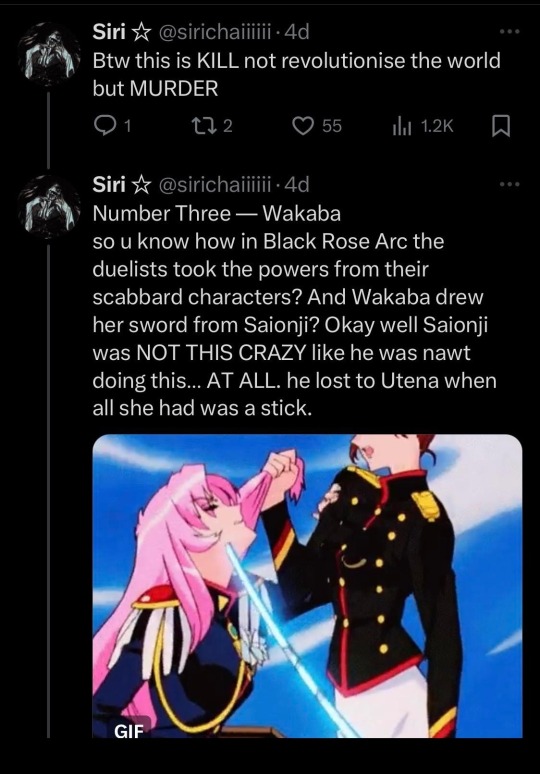




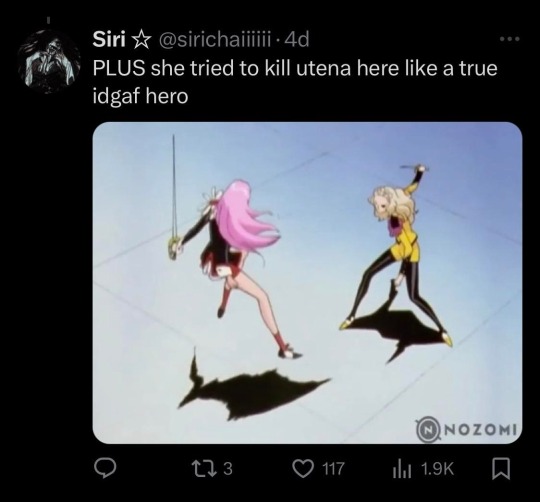
great thread and all but when I saw that first picture I absolutely thought that chu-chu was going to be on the list and I'm a bit disappointed that he wasn't. chu chu could kill akio
138 notes
·
View notes
Text
I want to talk about episode 25 of RGU, specifically the switch from Utena pulling the Sword of Dios from Anthy, to Anthy pulling the sword from Utena, and the direct fallout of that.
Since on my first watchthrough of the show, I've read pulling a sword out of someone as symbolism for holding power or trying to gain control in a relationship. There's obviously the inherent power dynamic between the duellists and Anthy,
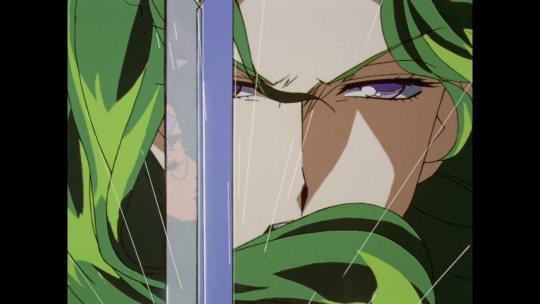
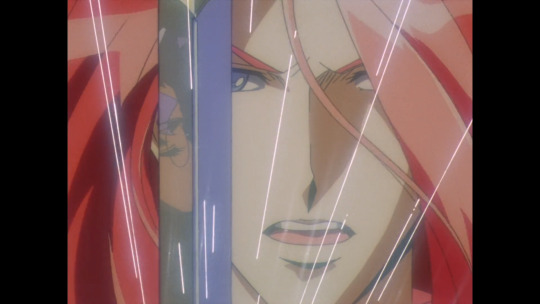
everything in the Black Rose arc,

and this comes back again in episode 38 where Akio draws swords from both Utena and Anthy.
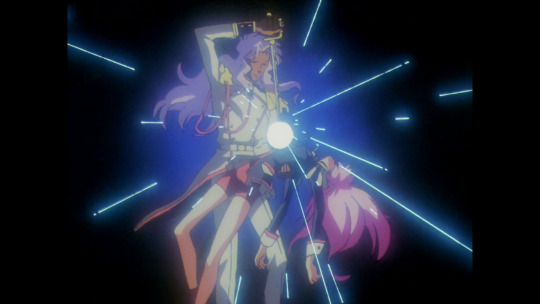
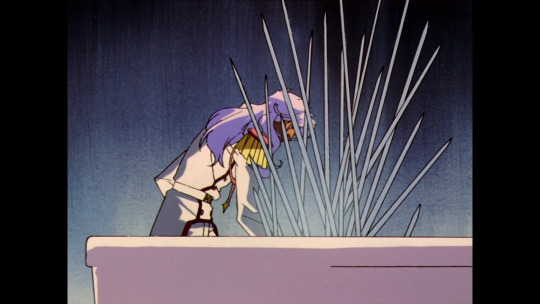
Back to the point, in episode 23 Utena first openly acknowledges that Anthy's whole deal isn't as cut and dry simple as she first assumed it to be.


Then in episode 25, Utena emphasizes that she wants to have a genuine friendship with her where they're able to support each other.


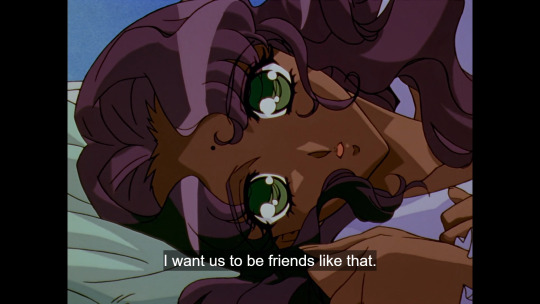
Anthy almost opens up
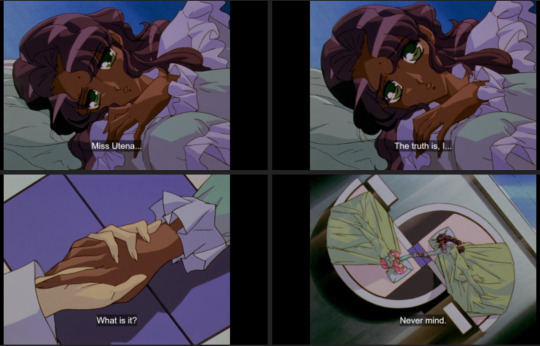
and continues to drop hints later down the line


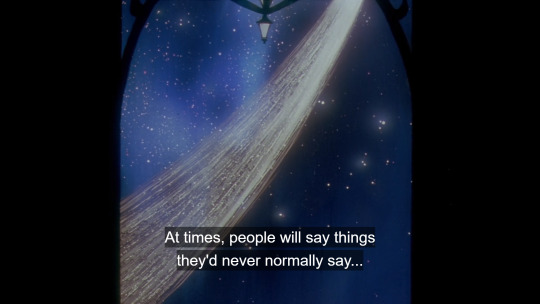
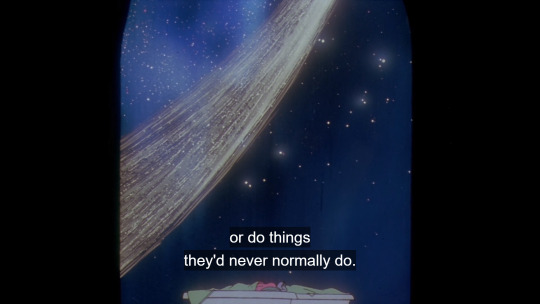
Later in episode 25, during the rematch against Saionji, Utena's sword vanishes and she's helpless to defend herself against Saionji who just keeps swinging at her. And then this whole thing happens:
This is the first time Anthy straight up steps into the battle. She has encouraged and warned Utena before, but here she pushes her out of the way before pulling a sword from her.
Not only did the shadow girls before this duell talk about team work and not only does Anthy say they gotta do this together, they say "Grant us the power of revolution!" as opposed to Utena on her own normally saying "Grant me the power to bring the world revolution!"
It's also worth mentioning here that even Akio didn't expect this development.

If pulling a sword from someone smybolizes holding power or trying to gain control in a relationship, I believe the switch between Utena and Anthy marks a shift in their dynamic because Utena is really truly trying to level with Anthy, gaining her trust, and growing closer to her.
And what makes me even more sure of this is how both Anthy and Akio react to this situation.
Anthy, from the ending of this episode forward, becomes more defiant towards Akio in small, subtle ways. From just not as freely going along with everything to concealing things and refusing to respond to questions.
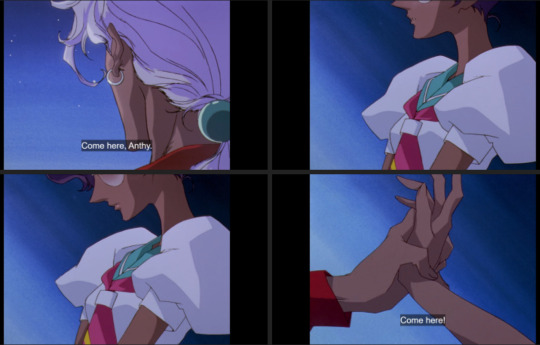

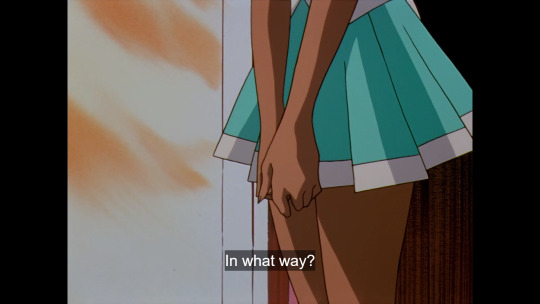

Akio on his end basically tells Touga in episode 26 that Utena and Anthy need to be seperated
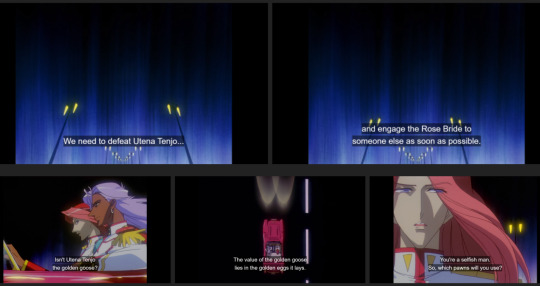
Episode 25 is such a huge turning point in the series in a lot of ways and I could keep talking about this whole development bleeding into the rest of the series, but as I said I'm focusing on the direct fallout of the sword switch.
#anyway I'm super normal about the sword switch#utn#anthy tag#rgu meta#rgu#revolutionary girl utena#flashing
60 notes
·
View notes
Text
i reached the cow episode in the rewatch and i don't really have anything to say that hasn't been said before EXCEPT
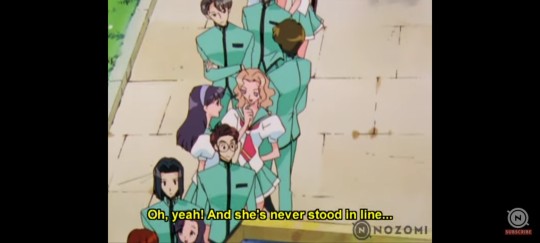
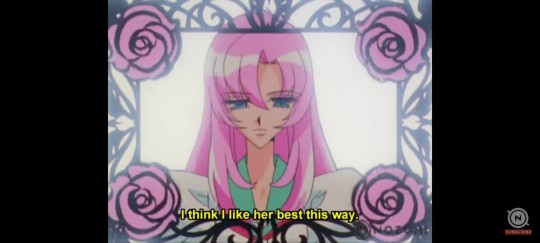
hmmmmmmm
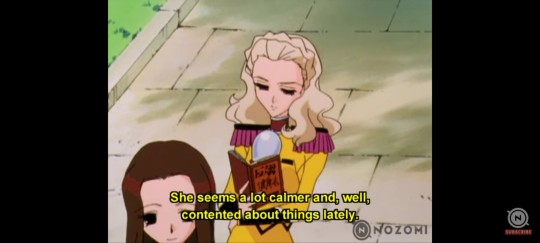
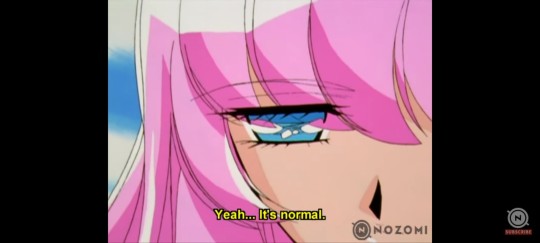
HMMMMMMMMM.
It's not too direct but something about the line in the 2nd Nanami screenshot in particular made me think of Utena in Ep.12. Something about how Nanami lost a lot of her spunk as a cow, that was content to stop trying. Not in the "oh Actually Fuck All This" type of way that she, Anthy, Utena and co. acheive at the end of the series but more in a "I've stopped thinking about it and, even unknowingly, have accepted my role as dictated by this world". Which is a stark depature from the Nanami we know, who's always questioning things. (hell the next episode perfectly showcases this)

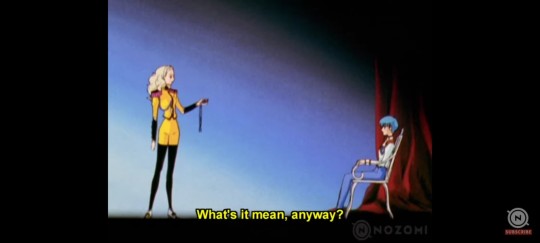
Nanami, when most engaged with the dueling system, is one who breaks the system. Her first duel, she keeps fighting after losing her rose. The Black Rose saga, she's always asking "does it hurt?". The End of the World arc, she intrudes on the Penthouse and takes Anthy's place in the fucked-up gay bed.
But here she’s resigned, going through the motions of life as she becomes a cow, a being that lives taken care of in never-changing pastures until it’s life is taken for reasons it doesn’t know. Sound familiar?
All girl’s are like the Rose Bride, and the Rose Bride is the only one who can see this.
#revolutionary girl utena#rgu#nanami kiryuu#utena tenjou#anthy himemiya#shoujo kakumei utena#sku#rgu meta
420 notes
·
View notes
Text
hnnnngrh an RGU Meta Idea has me in a chokehold so bear with me while i brainvomit about saionji and his masculinity vs the ideal of 'prince' and how it plays into the power hierarchies ohtori sets up
he's the very first antagonist we encounter, right? literally our first impression of him is "he hit that poor defenseless girl! that he was supposed to be dating!!! what's wrong with him!!!!" and then he rejects wakaba's love letter and utena duels him and the show kicks off. our very first impressions of him in the very first episode are that he's mean, he's cruel, he's inconsiderate, even that he's a brute. that--and this part is important--he is Masculine In A Bad Way. in ohtori everything is tied up in gender, and saionji is assigned the labels of 'man' and 'masculine', and so when he does bad things he is doing bad things as a man, right? he is, of course, hurting people, but more importantly to my point he is not performing manhood in an acceptable way. his masculinity is somehow corrupt or lacking or Wrong. in this way utena's victory over saionji in the first duel isn't just a triumph of "good" over "evil", it's a triumph of specifically utena's Good Masculinity (protective, sympathetic, princely) over saionji's Bad Masculinity (cruel, inconsiderate, not princely). rgu doesn't give a specific name to Bad Masculinity like it does to Good Masculinity (prince), Good Femininity (princess or bride), or Bad Femininity (witch) (possibly because akio is metaphorically the one behind the camera and doesn't want to draw attention to the idea of Bad Masculinity in a way that might allow women a legitimate advantage over men, possibly because outside of rgu there's no corresponding specific fairytale role for Bad Masculinity) but it's still there and, more importantly, it's still being used to uphold the hierarchies and illusions of ohtori
because if we go back to the idea of Good vs Bad Masculinity, and then we take the rest of the show into account, we see that Good Masculinity isn't 'good' because it helps people or reduces harm, but because it upholds the systemic hierarchies and dichotomies of Ohtori. the role of 'prince,' the term for and model of Good Masculinity, is inherently a limiting one for both the 'prince' himself and the 'princesses' he saves. which makes that first duel no longer straightforwardly a positive thing, but among other things a reinforcement of those same harmful hierarchies and dichotomies.
and of course saionji isn't actually the archetype of Bad Masculinity (which i want to call the 'brute', but i'm not sure i want to dive into the racial/imperialistic connotations of 'brute' vs 'prince' in this post) that he's presented as in the first episode. he's a character in his own right, and throughout the series we see that this first impression we got is, while not entirely wrong, at best a surface-level reading of saionji and the roles he plays in the narrative. and what illustrates this tension between impression and reality best is how he acts when wakaba's keeping him in her apartment: as the essay Fight/Flight, Rest/Relaxation by Giovanna points out, possibly the only time that saionji is every truly happy or relaxed is when he's staying with wakaba--in other words, when we see him outside the systems of ohtori. of course, that happiness isn't totally pure either, because wakaba is using saionji as her Shining Thing so that she can go from the non-special side of one of Ohtori's dichotomy to the special side, because unlike saionji at that point wakaba is still participating in those same systems. and yet. when working inside the systems of ohtori saionji is cruel, uncaring, rude, mean. outside the systems of ohtori saionji is happy, relaxed, straightforward and honest and genuine and kind, even.
and in the end that's the key, isn't it? now we understand his behavior in the first episode not as caused by his being a Bad Person. there are no Bad People in RGU, save perhaps akio. no, now we understand his behavior here as a kid, lashing out and hurting people because he's hurting, because he lives in a system in which violence is presented as the solution, because no one taught him how to manage his own emotions and he has no access to or knowledge of that information. because he's a kid growing up in a system that turns his emotions and his straightforwardness against him because they're a threat to that same system. saionji is assigned the archetype of Bad Masculinity not because he hurts people but because his native personality threatens the system. and when that same system begins to repress those innate parts of himself, when he's angry and in pain, the system teaches him to lash out and make other people hurt like he hurts, reinforcing the emotional isolation, reinforcing his pain, reinforcing the roles the system imposes on him and the shallow image those roles project to other people. he's angry and miserable because he's isolated by the system, the system teaches him to lash out and push people away, people respond to that by not getting close which reinforces his isolation. the cycle continues, one gear among many, revolution after revolution after revolution and nothing changes.
but there's hope. there's a glimmer of another path here, and it lies again in that contradiction. the cycle is one of violence; it takes work to maintain ignorance. outside of those cycles, the systems of ohtori, saionji is no longer bound to that path, no longer cast as the Bad Masculine. when he's living with wakaba, all that anger and pain disappears, almost, and he flourishes. if he can leave the system he can break the cycle. a gear fixed in place in a machine turns and turns and turns and gets nowhere; a gear fallen out of the machine can roll forward for a great distance.
all girls are like the rose bride. all boys are like the duelist. and all of us are trapped in this hell of human making...unless we choose, like anthy did, like saionji could have, to walk away.
#saionji kyouichi#kyouichi saionji#rgu#revolutionary girl utena#sku#shoujo kakumei utena#rgu meta#sku meta#also touga definitely plays a role in how saionji's masculinity is shaped and repressed but i didn't get into it here#there's also something to be said about how rgu problematizes morality/moral character but i also didn't get into that here#anyways this show is incredible
32 notes
·
View notes
Text
Something something… them shearing a backstory is very important to me personally… something something

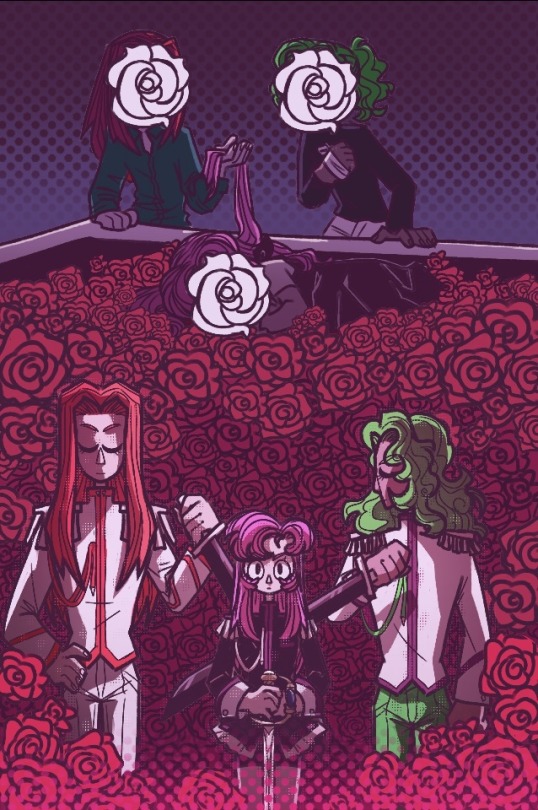

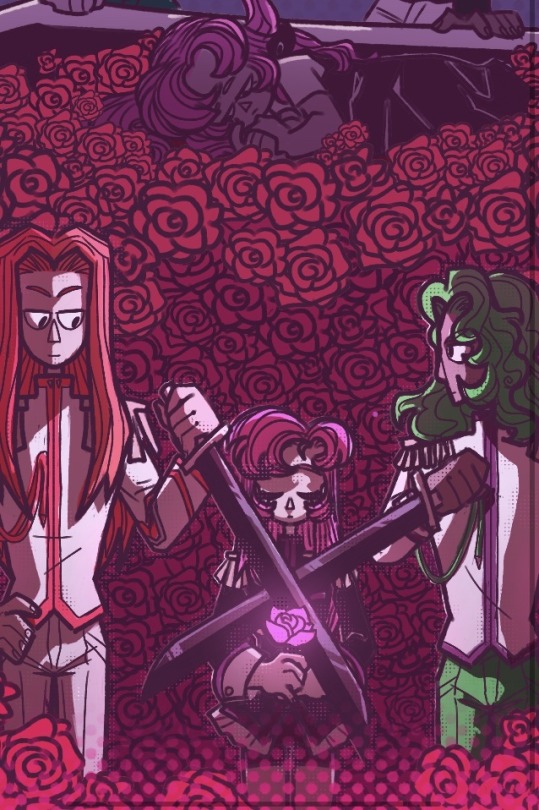
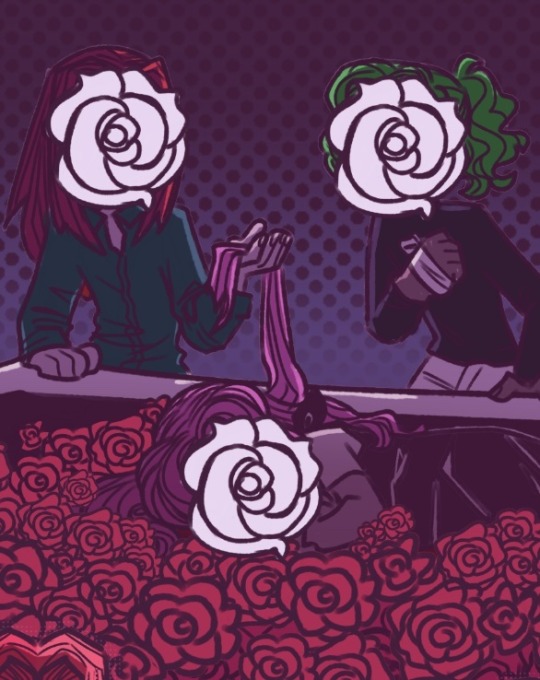

I have feelings about the fact that Utena doesn’t remember it, but this moment had such an effect on Toga and especially Saionji. It’s the way Toga idolizes Akio for “being the one to save Utena from her coffin”, and Saionji has become obsessed with finding something eternal, because as he says in one of the last episodes “we are all trapped in our coffins” I think that meeting Utena opened his eyes to his own coffin and this is why he is searching for something eternal, because he saw that Utena had somehow found it and he envies of her for being freed her from her coffin. Also the way they only have this backstory in the anime series ,the first time loop and not in the other three, Toga and Utena still share their backstory in the two last time loops. Saionji and Toga are hardly even friends in the other loops, I think this is because Toga is gradually healing from his toxic masculinity and both him and Utena are coming to terms with him being dead, but since Saionji never finds anything eternal (because it doesn’t exist and the thing that saved Utena wasn’t something eternal but her motivation to save Anthy/creat a world without oppression) he stays an asshole until the final loop (the movie)
#I very much like thinking about this#show???#pieces of media????#franchise?#what is rgu even#revolutionary girl utena fanart#revolutionary girl utena#rgu meta#rgu fanart#rgu utena#rgu touga#rgu saionji#kiryuu touga#saionji kyouichi#menma next generation#tenjou utena#long post
78 notes
·
View notes